#was in the final fight but I think the internal family conflict - paralleling him and ikarus- was so cool
Text
I still want to write about AoC Link and Wild meeting but first all elaborate on why they would parallel Wilds relationship with Flora.
Pre-calamity, Wild is repeatedly referred to as the physical embodiment of Zelda’s failures. He succeeded where she failed and no matter what she does, they’re forced together constantly.
Who would be the physical embodiment of Wild’s failures? What about a version of himself that survived the rise of the Calamity and is literal proof that Wild didn’t have to die, he didn’t have to lose everything, he didn’t have to fail. In LU canon it’s already been established that he sees this version of himself as someone entirely different and more worthy as a hero. In the end it was Wild who wasn’t strong enough to fight anymore.
While I don’t think that Wild would snap at this version of himself, at least not very easily, there are eight other Links between them so he would just happen to avoid him at every single opportunity. He would withdraw from the others, why would they need him if he’s obviously being replaced by a superior version. The only one who would possibly know why is Twilight who listened to Wild rant about how he was before. I think Twi would have to explain to AoC everything that’s going on, and why there’s a clone of himself that looks like he grew up in a pack of wolves.
The thing is that AoC would never think that he was better than Wild. He can tell that Wild does not want to be around him. He doesn’t go out of his way to get to know this roughed up version, even if he really wants to. He knows that Wild doesn’t like him but there really isn’t much he can do about it.
Also AoC could have the impression that Wild existed before any LU related bs. I mean, he’s met the new champions who he knows come from 100 years in an alternate future and I think there are voice lines that refer to the fact that they know a version of him. It wouldn’t be too outrageous to assume that he would know of the existence of a version of him from a world that couldn’t defeat the Calamity.
I think that Wild would resent that AoC was never alone. He had so much help constantly. He didn’t grow up knowing he was the hero and training for it, he still had friends and family that was alive and remembered and his Zelda never hated him. Everything that went wrong in Wild’s timeline, went right with AoC. Practically. And, as far as Wild knows, the only real difference was that AoC was just... better. He rose to be Zelda’s personal knight organically and it seemed like everything just worked out for him.
I think that the best way to resolve this is for Wild to somehow prove to himself that he is as much of a hero as the rest of them. Whether that be in the form of saving AoC despite their obvious difficulties in communicating, or him just being badass on his own and causing AoC to finally break his silence so Wild can have some kind of closure.
I’d want this to be different but still similar to the “blades of the yiga’ cutscene, where Zelda realizes that despite everything that she’s done to keep Link away, he still does his best to help her, because she knows that she’s been cruel to him. But with Wild and AoC, It’s less about resolving preconceived opinions and deciding to be better, it’s about resolving Wilds internal conflict and finally being able to accept that he is just as much of a hero as this version of himself whose entire being has been inflated in is head by other people who once knew him, who he was expected to become without really knowing.
now I want to write the fic so anything that I missed here will be there lmao, bully me if you want me to work on it.
159 notes
·
View notes
Text
An prediction about Cinder’s end that hopefully isn’t a stretch
My brain is on fire right now.
With a prediction.
I hope this prediction is not that much of a stretch.
After everything Cinder has done for Salem and not getting much back, including being blasted by Silver Eyes energy, having to deal with failure after failure, including Arthur yelling at her, Emerald's & Mercury's loyalty to her, and her flashback finally appearing in V8-
She is going to do something to finally rebel and let all of her anger and frustration out on Salem, who is a worse mother figure than her own mother and two sisters.
And regretting not going with that Hunter so long ago.
She would snap, take the Staff of Creation, and break it in half, freeing Ambrosius.
Then, she would order the Jinn of the Relic to repair Atlas/Mantle, to let her Evil Stepmother see all of her destruction slowly become undone, take the Lamp, give it to Mercury, shocked & reluctant, until she screams her last order to GO, and tell him, while a portal gets made, to meet up with Emerald.
She would hold Salem, Tyrian, and the Grimm within the Grimm whale as much as she could with her Fall Maiden powers.
She ain't doing this for the good of the world.
She is doing it because she HAD. ENOUGH. Of trying to please someone for so long.
And Cinder's last thought would be Ruby Rose, after thinking on her life as she eventually dies from her fatal wound. Thus, making Ruby Rose the Fall Maiden. The girl that she has been fighting against since V1. Someone who might be more worthy of having this kind of power than Cinder thought, when she first got the power.
Or Nora maybe, just because. I dunno.
She would go out in a blaze of final glory against her 2nd abuser.
Hazel is dead, Emerald is on the good guys' side now, Arthur is dead, Mercury would now defunct too in this prediction, Roman is dead, Neo is her own thing in V9, and Adam has been dead since V6.
Once this one action of rebellion is done, all that would be left is Salem and Tyrian, which he would fit in the deserts of Vacuo.
I predict that this might happen in V10's beginning, not at the final battle.
This could be a curve ball when V10 premieres.
SURE. I might be giving RT too much credit to pull something like this.
But, this kind of ending for Cinder's character would fit. She is an allusion to Cinderella after all.
An abused girl in a cruel family that rebels finally when she meets her Fairy Godmother, but not with violence in the story, but going to a ball and meeting her Prince, with a glass slipper that was made for her.
Though, not all of the details of that story would be alluded in RWBY. You know how it is.
And yes, Cinder wants power.
But, you would think that she would eventually doubt if her goal is even worth getting at the point of V7-V8.
Parallel to Ruby's current internal crisis of who she really is and if her goal of being a Huntress to help people and the world is even worth it.
But, Ruby would find hope, like I said in my previous RWBY post, and not let anyone sacrifice themselves, maybe just sacrifice her desire to be like her mom, while Cinder sacrifices her LIFE GOAL for sake of rebelling against her Evil Stepmother just once.
Just this once!
It would be sad, yes. People would still dislike her and other would still love her.
But, I would prefer Cinder to go out in one last blaze of glory.
And a blaze that fits her character and who she is based off of.
Making Salem's V8 victory short lived and ironically pyrrhic.
Roman did say that world is cold, unfair, and cruel basically.
It can mean that both sides of a conflict experiences that, not just the heroes.
And you can imagine Emerald seeing Mercury with the Lamp, hearing that Cinder is dead, the Staff of Creation is broken, and then, Team RWBY hearing this, while Ruby is now feeling odd, now having Maiden powers and obviously, feeling terrified and unsure on how she can even use them.
------------------
~The Bat~
2 notes
·
View notes
Text
I want to talk about the parallels between bathena and buddie (as individuals and as ships) because 4x14 directly paralleled them, down the words Buck and Athena said to Eddie and Bobby (“I’ve got you”), and I want to explore that more. Under a cut bc this is on the long side.
I’m going to talk about the characters first, and then the dynamics.
So, Bobby and Eddie first. Bobby and Eddie are both widowers who carry massive amounts of guilt over what they perceive as failures in their past marriages, though Bobby’s were more severe. They both packed up their lives and moved to Los Angeles to escape the weight of their traumas and those perceived failures and start fresh. They’re both family driven and motivated, whether that family is their actual kids or their team. They both have a natural paternal energy about them, as well, they’re devoted and loving fathers, and they both have an overwhelming desire to protect the people they love, a belief that it’s their responsibility to keep everyone safe.
Buck and Athena! Buck and Athena both have baggage from judgemental and harsh parents with impossible standards, and they’ve both channeled those insecurities into being the best damn first responders they can be. They’re headstrong and stubborn and will do whatever it takes to save or protect as many people as possible, even if it’s reckless or dangerous, the show even parallelled them this way in 3x18 (“I’m not Athena”). They’ve both felt abandoned and hurt by people they loved, and internalized those moments as failures on their part, even when it really didn’t have a lot to do with them (Maddie not being able to leave Doug and Abby’s mom dying vs Emmett getting shot and dying and Michael coming out as gay), which becomes an issue in their relationships later.
Alright, and now I want to get into the dynamics. (I say dynamics bc “couples” isn’t technically accurate just yet)
In both dynamics, one of them already has a kid(s), and their dynamic therefore is not just about the two of them, but about their kids as well. Both stories aren’t just about falling in love, they’re about building a family together. Both dynamics also deal with the possibility of losing someone you love, which granted is a factor of their jobs. But I would argue that it’s a much more prominent feature for bathena and buddie than it is for henren or madney. And because of that, both dynamics emphasize the ways they want to protect each other, to have each other’s backs. Whether it’s Bobby being the only one to know that Athena isn’t going to take the promotion offered to her, or Eddie knowing when Buck is doubting himself and reassuring him, there’s this through line of understanding and trust.
And that brings me to the bathena conflict in season 4. The trust between them was fractured on both sides, first when Athena starts making decisions without talking to Bobby, and then when he starts hiding things from her, and eventually it all comes to a head. But just because they fight, doesn’t mean they stop loving each other, doesn’t mean they don’t stop choosing each other. They work things out. Because you don’t find love like that, “you make it” and that means sometimes it’s hard, sometimes you have to work for it. It’s not easy.
And just because something is easy, doesn’t make it right.
I think it’s worth noting as well, that they used the word “partner” throughout the bathena arc this season. First “there’s a reason she doesn’t have a partner” and then again with the family game night scene and finally when Athena says she needs her partner back, symbolically affirming their relationship. It’s about marriage as a partnership.
Interesting, because Eddie’s marriage failed because he wanted to be a provider, not a partner. And interesting because really, what better word is there for Buck and Eddie than “partner”?
220 notes
·
View notes
Text
Levi and Zeke: Their similarities and the Fundamental differences between Them:
I’ve recently been having a discussion with @ourmondobongo, and it’s spurred me to want to kind of analyze further the fundamental and philosophical differences between Levi and Zeke. I know I’ve gone into this thoroughly already, but my discussion with ourmondobongo has really made me want to delve in even deeper. First though, let me thank them for, as always, inspiring such insightful discussion among the fan base!
Some really interesting ideas were posted here, about Zeke’s experiences growing up in Liberio informing his world view and his views on the worth, or rather, lack thereof, in human life. ourmondobongo suggested that, because of Zeke’s experiences with his parents, utilizing him as a tool for the Resistance, and his subsequent utilization by the Marlyean army as a tool of war, it ended up warping his perception, and influencing him to believe that all human life is inherently worthless unless it can be molded into a tool or a weapon to further some goal. I agree with this interpretation of Zeke’s mindset and what shaped it. This is undoubtedly how Zeke views the world, and humanity as a whole, and he’s deemed, because of his own suffering, brought about by his experiences affirming this world view, that life is not worth living. Because he sees life as without value unless one can make themselves useful in some way, in his view, the suffering inherent in that makes life fundamentally pointless and meaningless and not worth the effort.
Now, where I diverge slightly from ourmondobongo’s view on this is in relation to Zeke’s influence upon Levi in the final arc, or rather, what they say about Zeke’s philosophy overriding or undercutting Levi’s own. They said that Levi’s belief in an intrinsic value in human life is bombarded and undermined during the final arc of SnK, Zeke’s own belief in the worthlessness of human life being affirmed to him again and again by the chaos and destruction around them, the rightness of his philosophy and belief that this sort of destruction can only stop with the eradication of the Eldian people being confirmed. But see, the thing is, I don’t think Zeke is at all showing Levi something new, or something which he hasn’t already known all his life.
Zeke claims that his experiences in life make him uniquely suited to understanding the conflict between Eldian’s and Marleyeans, and that his experiences make him uniquely capable of knowing how to solve that conflict. But Zeke is nothing if not a unfailingly self-centered egotist, someone driven purely by selfish, egotistical viewpoints, unable and unwilling to perceive anything outside of his limited world view. His life ISN’T unique, his experiences AREN’T unique. They’re, first of all, shared by every single Eldian on both Marley and in other countries around the world. Further, and more importantly to the point I’m about to make, they’re shared by Levi.
Zeke grew up being treated and regarded as a second-class citizen, relegated to a limited area, an internment zone, which he wasn’t allowed to leave unless given direct permission by the powers that be, and regarded as something less than human by the people of Marley. Well, these are all things Levi himself experienced growing up too, and, I would argue, to an even more extreme degree than Zeke.
Levi grew up in the Underground, a sprawling, subterranean city filled with the so called “dregs of society”. A place where the poor, the persecuted, the sick, the dying, the deviant and the criminal were either forced to flee to, or more unfortunate still, were born into. All this underneath the Capital of Paradis, Sina, the richest, most exclusive district inside the Walls. A place where the elite of society lived and worked and raised their families in wealth and luxury. The irony of the poorest, most poverty stricken area inside the Walls being directly beneath the richest, most affluent area inside the Walls can’t be overstated.
Perhaps most relevant to note in this comparison between Zeke’s experience growing up in an internment zone and Levi’s growing up in the Underground, is that the people of the Underground were not only considered second-class citizens, but relegated to something even below that, considered not citizens at all. They were literally denied citizenship within all areas above ground, within the Walls, and if they somehow managed to make it to the surface, and were found out, they would be promptly deported back to the Underground, where they would continue to be denied any and all rights given to the people up above. And, it can be easily argued, that the people of the Underground were treated in many ways significantly worse than the Eldian’s inside the interment zone in Liberio. The people of Liberio seemed relatively well provided for, able to find work, able to earn a living, able to have homes for their families and put food on the table, essentially allowed a sustainable and comfortable life, if one burdened by outside prejudice. They weren’t made to live in squalor. Largely, no doubt, because they were seen as an unwanted, but useful resource for the Marleyean government. The people of the Underground were provided no such provisions. They were viewed as simple refuse, society’s unwanted and unneeded surplus. Poverty and depravation ran rampant in the Underground, a lack of resources and support from above resulting in high crime rates and desperation, to things like murder, prostitution, violence and other sorts of criminality. Further, leading to things like rampant orphaning of children, likely due to starvation and disease claiming the lives of parents, etc... It was a place literally cut off from the sun, a world of perpetual darkness, sickness, poverty and dire straits. They received no aid or support from above, were not provided any of the benefits or privileges of the people on the surface, were not offered any sort of path to success, or betterment of their lives. They were just plainly rejected and left to the whims of fate. This alone makes it a more difficult and desperate place than the interment zones of Liberio, for even there the Eldian’s were given opportunities to improve their lives through the Warrior Unit programs.
You might try to point out that Zeke’s experience differs from Levi’s in how he was taught that he, and on his assumption, every other Eldian, would only ever be seen and treated as a tool to be used for some greater gain, and that Levi, at least, had the love of his mother, and Kenny to show him the ropes of how to survive in a place as ruthless as the Underground, and so Levi couldn’t possibly understand what it means, the way Zeke does, to be seen as a tool, or to be deemed worthless outside of ones utility. But I would counter this simply, by saying that Levi grew up, spent the first, several years of his life, in a brothel, where the very mother who loved him also worked as a whore. Through this experience alone, it can be easily assumed that Levi was exposed to repeated instances of his mother being EXACTLY used as a tool, as an object who’s sole purpose was to give men pleasure. From his birth, then, Levi was exposed and taught the brutal lesson that the sole most important person in his life, his mother, the one person we can assume was the only positive influence and relationship he had, for the first, several years of his life, was seen and treated by everyone else as nothing more than a tool for their basest and most perverse satisfaction. I can scarcely imagine a more horrific or cruel example of a young child being taught the same lesson Zeke seems to think is unique to him alone, that people’s lives are worthless outside of what use they can provide for someone or something else. Beyond that, Levi was again forced to face a situation in which he and his two, closest friends in Furlan and Isabel were used as tools by other people, recruited by Lobov to kill Erwin and retrieve from him an incriminating document, promised, if they succeeded, citizenship above and a handsome payday, only to find out later the entire scenario had been set up by Erwin himself to press Levi and his friends into military service, to be used as tools in the fight against the Titans. Both of these are prime examples of Levi being faced with the lesson that he and those he cared about were seen by people above ground as nothing more than tools, to be used at their disposal. So this was a concept Levi was already well acquainted with by the time Zeke showed up, a merciless lesson in the harshness, violence, brutality and suffering of life. Zeke didn’t experience anything Levi didn’t in turn, and in many ways, with greater extremity.
Anyone trying to claim, also, that Zeke had no positive influences in his life like Levi did would be wrong. Zeke had Mr. Ksavar, for one, and his grandparents, for another. Mr. Ksavar asked nothing of Zeke, merely showed care and concern for him, and a desire to spend time with him, playing catch. It was Zeke who offered to inherit the Beast Titan from Mr. Ksavar, not something forced on him. And while Zeke’s grandparents may have tried to enforce Marleyean history on him in regards to the Eldian’s, they did so out of love for him, in a misguided attempt to PROTECT him, because they cared, not because they were trying to use him in any way.
My point in talking about all of this is to draw a parallel between Zeke’s life, and Levi’s, and then to demonstrate how, despite deeply similar life experiences, the two of them diverge in vital and fundamental ways which, more than anything, can only be attributed to their strengths of character and natural inclinations as people.
Essentially, the gist of my argument is this. Zeke is a bad person. Levi is a good person. And there can be no excuses, or influencing factors found in either of their lives to credit for the way either of them turned out, other than themselves, other than their own natures.
Because Zeke let his life experiences twist him into a heartless, emotionless, unfeeling sociopath who murders other people without remorse, and regards other human lives as meaningless, worthless trash, expendable and disposable as a means to his own ends. He let his experiences in life serve as an EXCUSE for his natural cruelty. He chose to view the lives of others only through the prism of his own experiences, and cast a judgment upon the worth of those other lives. The true reveal of Zeke’s megalomaniacal egotism is in how he finds himself unable to separate the lives of others from his own. In how he’s unable to view the lives of others as anything other than an extension of his own existence. Because he deems his own life worthless, then so too must be the lives of everyone else.
Levi, then, is perfectly his opposite. It isn’t because of Levi’s life experiences that he’s turned out the way he is. It is IN SPITE of his life experiences that he has. Everything Levi’s ever experienced in his life, according to Zeke’s philosophy, should have turned him into a monster. He should have come out of the Underground a sociopathic, unfeeling, brutally uncaring and violent man, ready to take from and use others for nothing more than his own, personal gain, because that was the lesson his life had taught him. Because that was what he’d been shown over and over again. That life is cruel, and ruthless, and uncompromising in its unfairness, and that to live is to suffer. And yet, Levi came out of the Underground with a greater capacity for compassion, feeling, love and kindness than any other character in SnK. He continually and routinely, throughout the series, demonstrates an incredible empathy, consideration, sympathy, generosity and understanding for other people. He is immensely accepting and nonjudgmental, and always, always goes out of his way to express gratitude towards others for their own sacrifices and efforts. He does his absolute best to protect the lives of others, constantly putting his own at risk to help others live, constantly putting his own at risk to save whoever he can. Constantly and consistently, Levi places the lives of others above his own in terms of worth.
And here’s the thing that makes Levi most remarkable of all. The thing which demonstrates beyond any shadow of a doubt the immense strength of his character. Levi very well knows that life is cruel, that life is brutal, that life is unfair, and that often people die for no damned good reason at all, that they suffer for no reason at all. He very well knows that people are breathtakingly cruel and terrible to one another, that people treat one another in unspeakably horrific and unforgivable ways. He very well knows that the dream of a lasting and peaceful world, a lasting peace between humans, is nothing more than a pipe dream, an unrealistic, unattainable ideal. A fancy only a child should genuinely be able to believe in. And yet, once again, despite KNOWING this, despite every lesson and experience in his life impressing this awful reality upon him again and again and again, Levi still does everything within his limited power to ease the suffering of others, to improve their lives, to protect them and show them kindness, to help in any way he can, whichever way he’s able. Despite knowing the futility of life, the pointlessness of suffering, the injustice of other people’s cruelty, despite knowing these things INTIMATELY, Levi still has in him an open, generous, kind and caring heart. Levi still has in him a deep, unending well of compassion and an unwavering desire to protect and better the lives of all the people around him. It isn’t even Levi’s own dream that he fights for, it is the dreams of OTHERS that he fights for. He can’t ever fully embrace this notion of a peaceful existence, free of violence and deprivation and cruelty, because he knows too well the way of the world. He’s been too mired in the indifferent reality of nature and the human condition to ever, really believe it. But in spite of that, IN SPITE OF IT, he fights to protect that dream and belief that others carry, that others strive towards, that others commit themselves to. He gives everything he has, every piece of himself, to protect a dream that he himself can’t even fully believe in, and for no reason more than that it is something which gives others hope, something which gives other’s a sense of purpose, something which one day, possibly, however slim the chance, might come to pass.
It is all in spite of Levi’s experiences in life, all in spite of his weary and cynical understanding of the world and the people in it, that Levi commits himself to kindness, compassion and the chance to help others, in whatever ways he can, even as he knows deep down the ultimate futility in it, even as he knows his own, relative powerlessness in the face of nature’s unyielding and uncaring apathy.
And that really is the fundamental difference between Levi and Zeke. Two men who have experienced such similar lives, and who have learned early on their lives the cruelties of existing in this world, but one who reacts to those cruelties with defiance and courageous opposition, standing in the face of overwhelming odds, while the other yields to it and lets it excuse his cruelty in turn, bowing to its power and letting it consume him.
44 notes
·
View notes
Text
So…reading millions of theories and watching hundreds of BTS snippets later. My husband already says I’m too invested in the show. Anyway…
I have a suspicion that Eddie is the one who’s gonna be hurt.
He had the least plot line this season and personally I think his character is yet to be opened and developed. The injury is also a great place to rethink your life choices and show character’s internal conflicts etc. The same way we’ve seen Buck in S2-3, him fighting depression, going to therapy, healing and getting his job and family back. Lawsuit obvs.
Also, do you remember who was the person to make Buck get out of the house? Eddie. So if we get a parallel of Buck this time being the one trying to make Eddie feel better. Finally, making him go to therapy to heal and fix whatever issues he has. And let’s be honest there are a lot of them.
Based on the 911 Twitter account reply about Buck moving in with Diaz family. Not like I believe it but no one denies the possibility, right? Plus, we noticed that 911 writers take some ideas from fanfics and guess what’s one of the most common plots there? Buck moving in with Diaz family and taking care of them while Eddie is sick.
About love life..it is so complicated. First Shannon, then Ana. In any case we don’t get to see a proper detailed picture where we can get used to the character and see a properly developed relationship. We get pieces in “Eddie begins” but let’s compare it to Bobby and Athena; even Buck and Abby (UGH). There’s a story, we see how they got together, the conflicts they had, them being a proper couple. We haven’t gotten that with Shannon, Ana, also Ali. I suppose eventually there would be a conflict between Eddie & A*a. I still think she’d be too nice to make Eddie choose between her and Buck. However, I have a suspicion that Buck would be somehow involved in the picture. Eddie might get confused with developing (hopefully) feelings to Buck and that would bring uncertainty to his and A*a’s relationship.
Plus maybe it will also tell us more about his relationship with parents. Remember after Shannon’s death they asked him to move to El Paso? What if this time he’s just tired and confused, so he agrees. Maybe A*a also affects his decision in some way.
And I suppose eventually we would see Eddie going through all the stages of accepting his feelings to Buck: denial => acceptance. Eventually, we get a proper relationship-family plot and screen time for Diaz family.
#911#911 series#911 fox#911 on fox#eddie diaz#eddie ana#evan buck buckely#evan buckley#edmundo diaz#christopher diaz#chris diaz#buddie#eddie x buck#eddie buck#buck eddie#buck x eddie#911 show#911 season 4#911 theories#d.e. buddie#d.e. writes
40 notes
·
View notes
Text
Big 3 vs Wonder Duo (Which one will end happening in My Hero Academia)
Okay this topic has been on my mind for awhile now i mean their is evidence for both the wonder duo and the big 3 (especially from the vibe that I’ve been getting from the war arc) So i’ll try to break down evidence for both sides and come to my final conclusion on what might actually happen at the end of the meta analysis
Big 3:
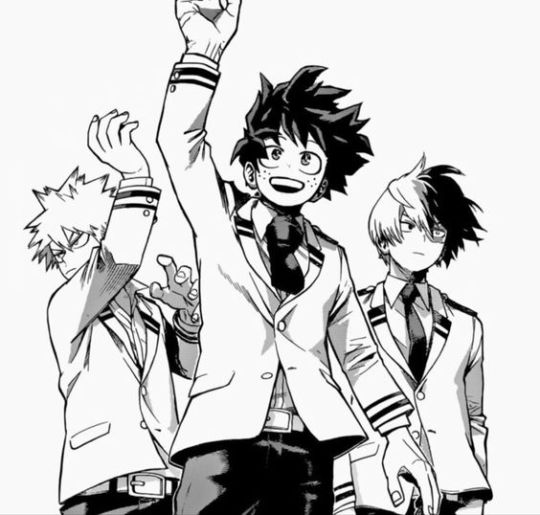
Alright lets start with the Origin trio. This trio first became a official hero combination from the Endeavor Agency arc. Within that arc we as readers were able to learn more about Shouto as a person and his family dynamic. Now you could say that Deku and Bakugou being their was due to the fact that they are the protagonist and deurotagonist (which are valid points since it would make sense for them to be present in the Todoroki family conflict since one Izuku has helped Shouto a lot since the Sports Festival and on Bakugou’s end he got to bond with him during their remedial license exams)
The Endeavor Agency arc is the first time that we got a hint towards a possible three way combination in terms of skills. Izuku and Katsuki learned more about Shouto’s home life and we even got Fuyumi thanking Izuku for being his friend (which was important in terms of a successful hero trio working in the near future) having all of the members in it have something that binds them emotionally will ensure the strength in their bonds.
Let me break down 2 dynamics within the Origin trio (Im saving Bakugou and Midoriya’s part of it for the Wonder Duo section):
Todoroki Shouto and Midoriya Izuku:
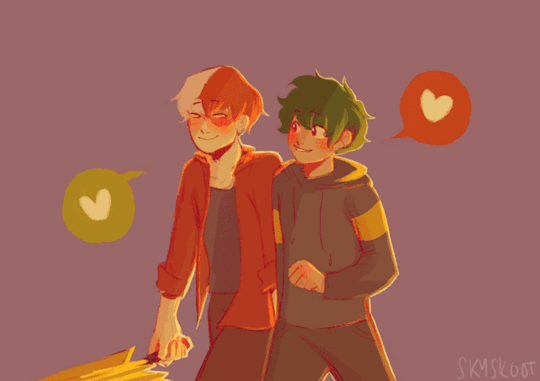
Izuku telling Shouto that his power isn’t his fathers but his own helped Shouto embrace himself. This big moment helped fans understand Izuku as a character and that he didn’t care about winning but being able to help Shouto accept himself for who he is.
When Todoroki and Bakugou fought at the Sports Festival Izuku was showcased to be cheering Shouto (who at that moment was hesitant to use his full power) this ignited his flames to come full force which was big for Shouto’s character
During the Stain arc Izuku sent out a signal to his location (which Shouto saw) and we see him worried for his friend and he makes his way to Iida and Izuku
During the aftermath of the stain arc Shouto showcases his worries and protectiveness of Izuku and Iida.
In the Forest Training arc Izuku was having trouble connecting with Kota and Shouto was able to give him advice by stating “ "Even he's told all the right things, if you don't know his background then you'll only succeed in annoying him" and continues with "The important thing is, what the person who's saying it has done...and what they're doing now. I think that words are always accompanied with deeds.",
Shouto’s advice to Izuku showcases how much Izuku trust his advice and judgement (again a big change from where they were from the Sports festival)
When Izuku fought Muscular Shouto’s words came back as a form of encouragement which helped him defeat the villian and become close with Kota.
"Even heroes cry sometimes." which was a quote Shouto said as a mean to help comfort Izuku who struggled when learning about all the horrible things that have happened to Eri. That scene showed how perceptive Shouto was in the feelings of others and also showed his method of trying to help someone.
When Shouto fought against Tetsutestsu in the Joint Training arc the symbolic moment that started the beginning of their bond which was the reminder of Shouto’s quirk being his own helped him with his fight
We also have their friendship being stronger when Izuku talks to Shouto about his path to forgiving his father and saying that he is kind (Endeavor Agency arc)
Izuku saves Shouto from Dabi by using black whip and states that Shouto is his “precious friend.” which that signified how powerful their bond is
I wont mention all the moments that they share as I am saving more on the shipping aspect for another blog post but my point on these two supporting each other endlessly still stands. Izuku has helped encourage Shouto when using his quirk and in return Shouto has given Izuku such helpful advice when stuck between a crossroad. From canon alone Horikoshi showcases their unconditional support for each other.
Todoroki Shouto and Bakugou Katsuki:
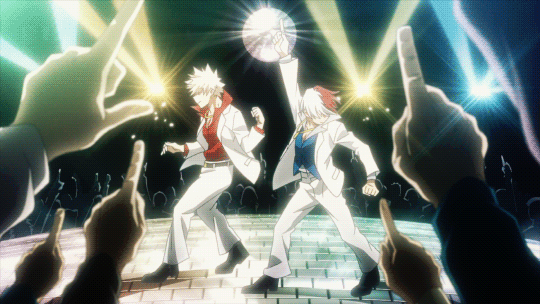
From what canon has given us in terms of the introduction of their bond Katsuki has viewed Shouto as another rival of his while Shouto isn’t scared of Katsuki and his temperament at all.
Shouto and Katsuki are usually shown to bicker and banter with each other which is usually fun to see when observing their dynamic
Katsuki overheard Shouto and Izuku’s conversation after the calvary battle (which in a way foreshadowed his bond with Shouto getting stronger since it was able to connect him to the other two)
The Forest of training arc was the first arc that showed how natural Katsuki and Shouto were with one another (as compared to the Sports Festival)
Their friendly bantering continues when they both have to retake the license exam again. The running joke of Todoroki insisting that they are friends and Bakugou denying this is always a joy to see.
Bakugou was one of the first people (alongside Deku) to understand Shouto as a person when they were interning with Endeavor
Bakugou and Todoroki in canon both notice each others strengthens and made multiple comments on this. One example of this is when Todoroki used one of his well known attacks from the Sports Festival against his fight with Deku and Bakugou states this while bantering with Todoroki which he quickly responds with “I weakened the blow by a bit. Are you hurt?”
During their retake to get their hero license Bakugou opens up to Todoroki about how he was raised and that violence is needed against their challenge with the children which Todoroki comments that there is a better way that they can get through to the children.
Just from canon context alone these two have such a playful yet rival like bond and even to the current point of the manga we never really see these two break out of their usual bickering and bantering. I wont elaborate much on this since I plan to do a post more in depth about all the personal relationships. In canon we don’t really see a lot for them being explored but the potential for them to bond more is their and I have no doubts that Horikoshi will do this justice (especially if the big 3 route is endgame)
The timeline of where the third MHA movie will take place can play a factor to this as well. If the movie takes place during the Endeavor Agency arc then it wouldn’t really leave much room for fans to interpret Shouto’s role after he finds out about OFA. However, if the movie takes place post war arc “All for One and One for All.” which was the movie teaser’s highlight it could solidify the importance that Shouto will have once he finds out what Katsuki already knew about Deku.
Big 3 Evidence:
Deku, Katsuki, and Shouto were all shown to admire All Might when they were younger.
Ever since the concept of the big 3 was introduced (Mirio, Tamaki, and Nejire’s debut) it gave fans the idea that a future big 3 will come into play. It was just a matter of who would be apart of it
War arc hints that Shouto will be let in on the OFA secret (which was something that binded just Deku and Katsuki before) with this knowledge it will connect the three of them
With quirks alone all 3 of them are compatible and would be an ultimate tag team
Endeavor Agency arc once more hints of the potential trio with Katsuki and Izuku fighting alongside Shouto in order to save Natsuo from Ending. The first time we got to see these three join forces and showcase everything that they’ve got
Small parallels between them and the current big 3 (Mirio and Bakugou) (Deku and Amajiki) and (Shouto and Nejire) I might make a post on the comparisons soon if you guys are interested.
Trios have been shown in the My Hero Academia universe (examples: rooftop trio which consist of Aizawa, Shirakumo, and Present Mic) which considering that the three of them wanted to open up their own agency as pros but sadly could not it wouldn’t be surprising that the Origin trio ends up doing so instead.
Endeavor hints on this possible trio by saying that the three of them need to have the three fundamentals which are rescue, evacuation, and battle. Izuku (Rescue), Shouto (evacuation), and Katsuki (battle),
Wonder Duo:
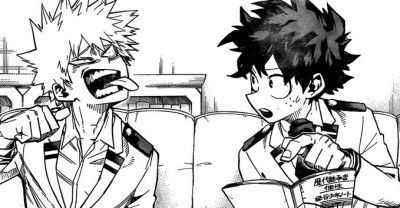
Shifting perspectives let’s discuss some evidence of Horikoshi ending the series with the Wonder Duo. Now with this hero combination it was stated at face value during Deku vs Kacchan 2 ( chapter 120) by All Might who says “If the two of you can recognize each other and honestly raise each other up, you can become the best heroes who both win and rescue.” This was the first indication that not only could they become a hero duo but also that these two would rekindle their broken bond by the conclusion of the series.
Bakugou Katsuki and Midoriya Izuku:
From what we know prior to the beginning of the series Izuku and Katsuki knew each other since childhood and that their relationship started off rocky (since they were set up to become rivals)
To show the closeness of Izuku’s connection to Katsuki he calls him “Kacchan” while even tho Katsuki’s originally meaning of the word “Deku” meant worthless Izuku took that name and made it his hero name.
For seasons 1-3 (before Deku vs Kacchan 2) Katsuki believed that Izuku had always looked down on him hence him pushing him away which he yet again confirms in the war arc that because of his weakness he ended up bullying Deku because of it
When Bakugou got kidnapped from the villains he states “stay back Deku.” and as a result we have Deku screaming out in agony when the villains took Bakugou away during the training camp arc
Following his kidnapping scene Deku cries at the hospital about not being able to save Katsuki (despite during that time of their development Katsuki wanted to push Izuku away)
When Deku vs Kacchan 2 occurred fans got to see Katsuki become vulnerable for the first time talking about why had it been him that ended All Might’s career. This following with Deku stating that he is “the only one who can accept Kacchan’s feelings.”
"to the same extent of all your unpleasant traits, your sheer amazingness at everything you do was so brilliant to me, it was blinding!" (quote from Izuku during the fight) followed by "You, who had so many things that I never had... to me, you were an amazing, inspiring person, who was even closer to me than All Might!"
Deku vs Kacchan 2 was the pivotal fight that changed the entire course of their dynamic since it was the first time that fans got to see the two of them unleash all their emotions that they had been keeping in for years
In Heroes Rising Deku shares OFA with Bakugou and commenting that "It's okay if it's you," when talking about having his childhood friend hold that power and also showcases Izuku’s trust in him.
During the Meta Liberation War arc when Izuku tries to find Shigaraki and try putting a end to all of this Katsuki notices this and follows him commenting “because being a hero means protecting everyone." foreshadowing the save mentality that Katsuki has when he put his life on the line to protect Deku from Shigaraki’s attack
Link to a perspective that tackles the possibility of Bakugou and Midoriya being a hero duo in the future.
https://sacred-stoner.tumblr.com/post/174064238438/the-other-day-an-anon-sent-me-this-ask-thank-you
Wonder Duo Evidence:
During the provisional license arc Aizawa talks to Mrs. Joke about how Bakugou and Midoriya encourage and inspire the rest of the class (with a screenshot of the two of them while he says this)
During the Final Exams arc Midoriya and Bakugou were partnered together to take down All Might and that fight showcased the miscommunication the two of them had (despite them winning against him in the end) the fore shadowing of these two working together could be hinted as far back as the final exams arc if thinking about how shounen writing sets up rivals.
All Might’s quote about the two of them being the types of heroes to “win and save” made a return as we are shown during the war arc of Deku trying to achieve victory while Bakugou gained a quirk awakening because of his desire to save Deku. In other words having them switch perspectives in the current point of the story really does come a long way
Horikoshi mentions that Heroes Rising was meant to be the original ending for the series which could mean that a) the scenario of Bakugou and Midoriya working together in the series finale would stay and that the main difference is that they would be pros or B) the duo would be changed to a trio and that Shouto’s involvement might be intertwined with Izuku and Katsuki... still unsure on which route)
When All Might vs All for One happened we had a screenshot of the two of them calling out for All Might to win. Showing not only their significance to All Might but also foreshadowing them working together in the future
Throughout the series Horikoshi highlights their bond as one of the focal points in the series by not only setting them up as proper rivals but also being able to repair their broken bond (which in turn all goes back to All Might hinting at them becoming a hero duo)
We’ve seen some duo combinations as well as trio ones in the series example being Hawks and Endeavor during the pro hero arc (it was temporarily but the point still stands that as fans we were able to see how successful a duo could be in the series)
Foreshadowing can come a long way since the series has started with Midoriya and Bakguou through middle school it very well could end with them finally fixing their broken bond and become the heroes that will win and rescue.
Sorry this took so long everyone I was just gathering my thoughts on this interesting discussion. I can see Horikoshi going with either route but as of right now its possible that we could get the big 3 while Deku and co are still teenagers and then have the wonder duo happen when they become pros (which if this were to happen then there would need to be some explanation on what happened to Shouto during all this)
Im unsure of whether the big 3 would happen when they are pros or only for the time that they are still teenagers.
I could also see Shouto being in charge of his father’s agency and allowing people with all types of quirks to intern there (especially if Endeavor ends up passing away before the conclusion of the series) which might be the likely explanation we will get if the wonder duo route is still something Horikoshi stands by.
Final thoughts: As of everything we have so far I will go ahead and say that we will actually have both with the big 3 being officially confirmed as the Origin trio while they are still teenagers but the wonder duo happens when they become pros. This topic was such a fun and interesting one to dive into so regarding personal bonds i’ll do another post.
This post is meant to view them as hero combination not shipping wise so with that said I hope this post was worth the wait.
#bnha#mha#boku no hero academia#boku no hero#my hero academia#midoriya izuku#bakugou katsuki#todoroki shouto#todoroki shoto#origin trio#wonder duo#big 3 vs wonder duo meta analysis#scftizuku: big 3 vs wonder duo#i hope you guys enjoy it#deku#kacchan#dynamight#endeavor#enji todoroki#aizawa shouta#all might#toshinori yagi
106 notes
·
View notes
Text
NEW POST FOR MY 95060 PLAYLIST!!! complete with explanations of every song choice under the cut because i love explaining my own creative decisions for some reason (PLEASE DO NOT FEEL COMPELLED TO READ ALL OF IT IF YOU DONT WANT TO ITS VERY LONG LOL). i may add a few songs here and there later on, or more likely rearrange what i've already put in slightly, but for now i consider it done.
alright now heres a look into my twisted mind
PART 1: TEMPTATION
Franz Ferdinand - Michael: It's a song about seducing someone named Michael. What more can I ask for (serious explanation is that it’s also very homosexually charged like you just have to listen to it… also feels taunting in a way where it’s like ‘oooooh you want me so bad’ and he’s RIGHT Michael DOES want him so bad). Also credit to this post for letting me know this song existed and inspiring me to make this playlist in the first place :-3
Mystery Skulls - Paralyzed: Just another song about how Michael is awestruck by David and feels compelled to follow him for whatever reason (the reason is that he wants him so bad)
TAEMIN - WANT: This is one of three Taemin songs on here because I think if David survived until present day he would fucking LOVE Taemin. Anyways this is a song about knowing you’re hot shit and everyone wants you and I think after seducing Michael through fucking?? Fatal motorcycle races and evil noodle mind tricks??? David deserves to feel that
Glass Animals - Gooey: OHGHGHGHFH THIS SONG… the vibes are impeccable on this one, Dave Bayley’s alluring voice feels like a slight remix of what David is going for and the way it feels like the singer is trying to convince the listener of something (even though it’s purposely vague) just FEELS like David with Michael. The line “I can’t take this place, I can’t take this place/I just need to go where I can get some space” especially fits when imagining how Michael is new to Santa Carla and may want a place to belong that David and the boys are happy to provide
TAEMIN - Impressionable: I see this as the moment that Michael downs the bottle of “wine”, where this song is David’s internal monologue reveling in how easy it was to charm Michael and get him to join. I always thought this sounded like a taunting villain song so it just fits. Also it’s like ridiculously horny which is a plus
PART 2: THE RELATIONSHIP ITSELF
MGMT - Me and Michael: In my head this is directly after Michael drinks the “wine”, and if it were an actual song in the movie, it’d play instead of Cry Little Sister in that scene. I already made art related to this but I really just love the juxtaposition between something that Michael will later see as horrible (becoming a half-vampire) and David seeing it as a perfect slow-dance moment. Also “Me and Michael, it’s not a question now” because the blood drinking has now linked them together… mmmmm. Credit to this post again for making me find this song!!
ALI - DESPERADO: This one is less about David and Michael specifically and more about how the night in the cave went down for everyone there, starting with a soft slowness as they ate and then descending into chaos as Michael downs the wine and they celebrate a new addition to the pack. The bacchanal energy is off the charts
Dorian Electra - Man to Man: This song is just one that I attribute to all of the boys because I think they do a lot of homoerotic sparring. Also the part of the movie where Michael punches David in the face and David just goes >:-3 back at him
Chase Atlantic - Friends: I don't know what it is about this one but it just Hits… The chorus kinda sounds like David and the boys trying to convince Michael to stay with them instead of coming back to human society after drinking the blood, in the same sort of taunting manner that they had when David (presumably?) made Michael hallucinate the bike lights and sounds outside of his house
Taking Back Sunday - You're So Last Summer: THIS SONG IS JUST REALLY GOOD. I don't know what it is about this one either… I guess the “Maybe I should hate you for this/Never really did ever quite get that far” part could represent the first glimpse of Michael’s more conflicted feelings about David. Also the second half of verse 2 not only fucks so hard but could also be indicative of Michael’s repressed gay feelings, lying to himself about how he wanted to be around David because he’s cool or whatever but he actually just has the hots for him and would let him do anything if he asked to
MGMT - Little Dark Age: Mostly here just for vibes. Have y’all seen that one edit set to this song? Yeah
The Neighborhood - Prey: I feel like this song captures the general unease that Michael feels right before he sees the boys kill for the first time, knowing that he’s probably turning into a vampire and something horrible is happening… especially with “Something is wrong, I feel like prey” just generally describing what it must feel like to be a human among vampires (though he’s not fully human anymore at this point)
PART 3: REALIZATION + FIGHTING BACK
TAEMIN - Criminal: YET ANOTHER TAEMIN SONG!!!! It’s all about realizing you're with someone who’s like, an evil manipulative villain and genuinely bad for you but you can’t escape just yet because you’re kinda into it. I don't think David is THAT bad of a guy, but Michael could be like “I need to get out of this situation because this man is a vampire but I feel attracted to him and it’s hard to really get away”. Also the line “My hands holding yours that stabbed me are not clean either” just HITS cus Michael hates David’s vampirism but HE’S a half-vampire now so it’s not like he’s innocent either. This is just a really good 95060 song AND a good song in general, listen to it even if you don't normally like K-pop cus it slaps
Glass Animals - Wyrd: This would be the moment where Michael snaps out of it and just starts running away, but to no avail, because he’s still a half-vampire (“You can’t run so you must hide” meaning that he can’t outrun his new monstrous nature, the best he can do is hide it until it eats him alive). Meanwhile David laments over how this is a stupid decision from his perspective (“So, my friend, our time is done/You and I could’ve had so much”)
Moonface - Minotaur Forgiving Theseus: This is a very veeeeery bitter song from Michael’s perspective about David being a vampire… with the “You’re just a hitman” repetition referencing how David. Y’know. Eats people. And the “I heard you're coming for me now” references both how David first approached him and the impending confrontation
The Neighborhood - The Beach: This song goes from the bitterness of the previous one to a pseudo-acceptance of the end of their brief friendship and what’s inevitably going to happen next. However, I think the bridge of the song illustrates the little bit of Michael that doesn’t want this to happen, that wants this relationship to somehow work out because he cares about David even if he is a vampire (unfortunately he ends up repressing this because he feels a duty to kill David now)
Gorillaz - Rhinestone Eyes: This is mostly in here because of the music video, the buildup to a battle just echoes in my head whenever I hear this song now. In the context of this playlist it makes me imagine David looking up at the Emerson’s house from the hotel (and Michael doing the opposite) knowing that something’s about to happen and it’s going to be horrible
Glass Animals - JDNT: This entire song feels like the climax of the movie. Verse 1 feels like the Emersons and Frogs getting ready to attack the cave (“I’m all armored up”) with “I feel that final poke” being when Marko gets staked, and the chorus right after is a tinge of regret that Michael feels once the plan starts to take shape. Verse 2 is the other boys waking up to see that Marko is dead + them dying themselves (“Where my funny friends gone?”) and the bridge is Michael and David’s fight before Michael finally gores David on the antlers. The outro of “You can’t breathe without me” VERY much feels like David taunting Michael from beyond the grave, knowing how much Michael loved him and how horrible what he’s just done is
PART 4: GRIEF
The Brazen Youth - Burn Slowly/I Love You: Ooooooghghgh the conflicted feelings about their relationship is STRONG in this one… The “Burn Slowly” part being him trying to convince himself that he did the right thing by killing David while the “I Love You” part is him realizing that he really did love David and it fucking hurts
Sufjan Stevens - The Predatory Wasp Of The Palisades Is Out To Get Us: MAN. MAN… Everything past “I can’t explain the state that I'm in” is just so… it’s Michael realizing what he had even more and just how much it hurts that he’s lost it. He knows he was in love now and it fucking hurts SO MUCH!!!!!
Sufjan Stevens - The Only Thing: [head in my fucking hands] Michael moping around Santa Carla because it feels empty without David. All the “should I tear my eyes out now?/Should I tear my heart out now?” parts oh my GOOOOOOOOD sufjan stevens i'm going to slap you on the head.
Paramore - Tell Me How: THIS SONG HURTS SO MUCH ITS SO. It’s another one about conflicting feelings so theoretically it should be earlier in the story but I always envision something very morbid when listening to this (and have now written a fic about it so check that out)… Michael going back to the hotel where he put David’s body and musing to no one, asking how he’s supposed to feel now, the “And always coming to your defenses” where Michael keeps defending David and their relationship to his family who all think David was a horrible monster… this song fucking hurts. Also I unintentionally drew a parallel between JDNT’s “You can’t breathe without me” and this song’s “Do I suffocate or let go?” and now that I’ve realized that it hurts even more. Fuck this song
#the lost boys#michael emerson#the lost boys david#95060#michael x david#david x michael#text#Spotify#i have thought sooooo hard about this playlist fr and theres so many individual lyrics and bits that i want to make art for#if i had all the time in the world i would#but. for now. enjoy :-3
41 notes
·
View notes
Text
Fruits Basket, Se03. ep 5,(part 1)
In part 1 of this post, more than analyzing, I want to understand few confusing things first. I’m not annoyed or angry, I’m just confused & trying to piece things together, so, kindly don’t feel off with my usage of (!!!) & (???). lol. I’ll ONLY discuss two things here that confuse me a lot. ( Real ep review/ analysis will be in part 2)
1- Momiji’s romantic love for tohru (the real love triangle). What?!!!!!
I’m so shocked that momiji loves tohru romantically! So, in order to understand ( where did this come from!!) I re-visited his scenes with tohru since se01 & trying to see if I missed anything! Below is my speculations:
Is it love at first sight?!!! When Momiji first met tohru he kissed her on the cheek. I’ve always thought lightly that in the eyes of the reserved Japanese (bowing is greeting), all Europeans (kissing on the check is greeting). hence, Momiji’s kiss, he’s half Europea. However, perhaps it is a Kureno/ Arisa type of love at 1st sight/kiss?! kureno nearly kissed Arisa on the lips on their 1st official meeting. But Kureno/Arisa kiss was meant to be romantic/sexual with adult kureno’s “ I wanted to taste her lips”. but Momiji’s is a peak on the cheek & he was a child, so... I don’t think he’s struck by love before he’s officially introduced to us the audience.
Is it gradual growing love like kyo’s ? in all Momiji/ tohru eps, he always just wanted to play with her, visit places & spend time together. (hot spring & beach vacation) are his own ideas. But momiji didn’t want tohru exclusively. He intentionally invited both yuki & kyo to the hot spring & even was begging kyo to come. He invited all zodiacs to the beach & wanted all to spend time together. I believe that the hot spring ep especially showed momiji as this playful, innocent & naive kid, wanting to share tohru’s females’ hot spring section. I don’t think momiji was madly in love at that time. He was a child going “ waaaa~, kyo hit me” & jumping here & there.
So, summer vacation? but then again, Momiji slept with the children & tohru doted on them all. He defended tohru but they all defend her & love her. he said to kyo that he “selfishly wanted to be with tohru” but I didn’t catch any romantic hints from that. Was it really that time?? they all wanted to spend time with tohru. Yuki said “ I’ll kidnap you”, kyo agreed to go to the beach right away, kisa was glued to her to the point of annoying hiro! So, when? & why not let us as the audience know abt momiji’s feelings.
Is it related to opening up to tohru abt his family issues? He confessed to tohru abt his dad, mom & momo. She cried for him & hugged him. I never got the feeling in all those scenes that he was in love! it seemed to me like friendship love similar to hana’s/Arisa’s or siblings love substituting his nonexistent relationship with momo.
Is it just me?? I always saw momiji as this baby in toddler clothes, jumping, laughing & a ray of sunshine! A child but with the most mature heart & mind. Tohru didn’t help momiji, he was already helping himself first & reaching healthy conclusions abt how he should deal with his own traumas. So, perhaps (Me) not seeing him as a teenager stopped me from seeing his romantic love? but they showed me hiro/kisa’s love. Elementary school kids! so?
Regardless of when he fell in love or how, the point is, this is heart-breathtakingly tragic! cuz (a) tohru never saw him more than a child at first, then as a precious friend, (b) she’s intensely in love with kyo, which brings us to tohru’s core issues. (Tohru loosing yet another loved one). Tohru’s own issues aren’t fully explored yet, but her love for kyo has been blatantly hammered to us since se01 finale! this is because kyo being locked in the cat room equals (death) which parallels her mom’s (death). Tohru will be living her tragic trauma again but this time, kyo replacing kyoko! Thus, giving tohru a room for growth & character development.Tohru’s intense love for kyo was shown in by the drastic change in her attitude in se01, ep.24, chasing firmly after him even when he pushed her & refusing to let go until he’s back home cuz she wants to! then yuki blatantly saying “ she loves him, too, the way she looks at him“ im se02, ep22 & “don’t worry, tohru, he won’t accept (the other girls confession)” in se02, ep 17 & all her scenes with kyo in that ep where she’s scared he’ll let go of her & other scenes throughout the 3 seasons.
...so why momiji’s impossible & unrequited love is introduced?
I believe it is to push kyo to not let go of tohru. To throw kyo into this internal conflict between selflessly letting go of tohru so she could be happy (like hatori did with kana) & selfishly wanting her to be his lover ( like haru). Kyo himself expressed these two conflicting thoughts in se02, ep, 9 “ I hoped we could always be together somewhere far off (selfish love) & “ I don’t want to take anything from you (selfless love). So, momiji is challenging kyo in a way making him realize that selfish love might not be bad afterall & selfless love could be harmful! cleverly reversing the two concepts. So, I get why this love triangle was introduced. but whyyyy momiji! T_T.. choose someone else, Writer-San! poor Momiji we learned abt his love the same ep we learned it hopeless & he can’t pursue! T_T. couldn’t you at least put the two scenes far away, so I get time to grieve his broken heart! T_T.
2- Yuki/Machi ( Yuki is in a such hurry!!!!)
You could use the analogy of yuki’s starting the story as a (baby/child) taken cared by his mother (tohru) who taught him to be a person (all se01), Yuki took this knowledge as a (kid/teenager) & formed friendship on his own with (kakeru) in (se02). it is not after yuki became a true equal friend to kakeru, chocking him & equally teasing him, that Machi was allowed to talk abt her self as a real character with agency & thoughts (se02, ep24), now yuki must be a (teenager/Man) & fall romantically in love, hence (se03, eps 2 & 3). All this is amazing. So, I kinda expected the following:
yuki won’t take as long as kyo in confessing/ realizing romantic love since he/machi don’t have a shared baggage nor obstacles from the past.
he won’t be as fast as haru’s “ i love you/ kiss/ make love”. But then again, Haru & Isuzu have already known each other for years & are already in love, they just put a name to their desires & went on with it.
So, yuki should be in the middle, noticing, knowing abt the person, crushing, then realizing love & wanting a future together! Cuz yuki is this type of person who values taking time thinking thoroughly, right??
I’m confused as yuki wanted to confess the curse & to be with machi romantically right after the machi background scene? I know not everything should be on-screen & him falling slowly in love could be off-screen... the flower is a yuki/machi “ noticing her stage”, her fighting with him over the red leaf is “ noticing him stage” for her. but there’s only ONE intimate scene of them together! Her raw tears when he comforted her in her flat (the chalk scene is bonus). but.. I never expected that yuki is planning to confess his curse & feelings this early!!!!!! yuki! are you SURE she loves you? ( I mean we the audience know 100%) but how is HE sure?? yuki going this big stage so soon felt a bit un-yuki. but then agin, perhaps that’s part of the new changed confident yuki? I duno, I mean Machi was never given a proper time to prosper, but yuki was always given all the time there is to explore his feelings & even other ppl’s feelings! He’s there in kyo/tohru ‘s story to tells the audience they’re in love, he’s there in Isuzu/ haru to mend their gap. I mean yeah there gotta be more scenes abt them for sure, we’re in ep 5, but I never expected a the intruppted confession now & this soon!
perhaps it’s just me, again?! Maye I’m so invested in yuki & accustomed to him always taking time that I kinda expected more before he’s thinking of confessing. I really thought that confessing his curse/love is yuki/machi’s own story climax compared to kyo/tohru’s story climax with kyoko & Isuzu/Haru story climax after breakup, oh well. I’m positive we’ll see more of yuki’s journey with machi as yuki is rarely absent in any eps. More scenes to come!
That’s the end of my headache! XD. I apologize for giving you headache if you were kind enough to read all this. kindly, don’t spoil future scenes or sub-plots to me. I’m just expressing my shock at how fast the plot moved! just few eps ago, I was watching motoko love journey that survived 3 seasons! Hands down Motoko wins in furuba! XD. Jokes aside, Can I say we’re officially where “the plot thickens?” Is it going down? This ep felt like a bullet train!
Side Notes:
I never liked the “children in deep love theme” that hiro has as children shouldn’t suffer the romantic pining & suffering as teenagers & adult ppl, so, I really appreciated that Momimi altho was 15 when we 1st saw him, lived his childhood without the “oh my! I’m so in love~ pining~ suffer”.
The story introduced ( momoiji in romantic love) the same ep Momiji got tall, so making it as sth he expressed once he hit puberty like most boys his age. He even said it “ I’m a man now”, which is again sth boys feel once they get taller & experience other feelings.
Momiji never catches a break! T_T. My son is denied the types of love he wants (parental love, sibling love & now romantic love! ).
I don’t picture momiji/tohru together as a couple cuz it wasn’t built that way in the story & most of their moments weren’t romantic/sexual tension. to me it was the ultimate friendship!
I wish my son finds love on-screen! If Moyoko/Nao gets on-screen love, give my boy on-screen love, too!
Nah~ forget that~ I’m just sad for my son, I don’t want to see him paired with any character quickly to compensate him not having tohru. This is not doing momiji justice. So, I get the ED art of him with Momo.
If kyo has someone who loves him one-sidedly (Kagura), tohru now has someone who love her one-sidedly (momiji).
The kagura/kyo confrontation was heart breaking, but it had to happen cuz kyo knew she loved him & had to stop her. I hope Momiji never confesses to tohru, I wouldn’t be able to survive seeing tohru turn him down.Tohru & momiji are just too kind for such sad situation.
So, does this mean that the two characters with unrequited love are Kagura & momiji? they’re the only characters with no romantic partner in the ED.
Hana is without a lover in the ED, too! XD. Thank God! I love her crush on kazuma, cuz hello~ who won’t crush on this hunk! & teenage girls can crush on grown up men rather than boys (I know I did, but it was just my girlish crush). I’m thankful it is just a crush & teasing kyo tactics & not true romance! don’t give me another Arisa/Kureno, plz. lol.
21 notes
·
View notes
Text
The Queer Platonic Love of Aang & Zuko
Friend. What a weighty and intimate word in Avatar The Last Airbender. The series’ “found family” is iconic at this point, and is literally established as a “family” by Katara in the third episode. She pulls Aang back from the outrage of the Avatar state, saying “Monk Gyatso and the other monks may be gone, but you still have a family. Sokka and I, we’re your family now.”
As I’ve said before, establishing this central safety net of trusted people is essential to Aang’s healing. Still, it’s interesting to me that they insist on this group as a “family” rather than something that might emphasize “friendship.” Something along the lines of ‘we’re your friends and we’re here with you.’ I can think of several animated shows that have done as much successfully. The show withholds the word “friend” for another purpose. I’ll happily admit that Aang and the others describe each other as “friends” throughout the series, but rarely is the use of the word (through pacing, repetition, or emotional context) given a sense of gravity in those moments.
However, three scenes in the series rely heavily on the word “friend,” and each scene connects Aang more and more profoundly with Zuko, eventually revealing that the show’s entire plot hinges on the friendship between these two boys. In a series so latent with symbolism, what do we make of these star-crossed friends? The relationship between Aang and Zuko, I want to suggest, is meant to explore Platonic Love in all its depth, especially within a masculine culture that not only devalues it, but views its queer implications as inherently dangerous to the dominant power structures of an empire.
Get ready zukaang fans for a long-ass atla meta analysis...
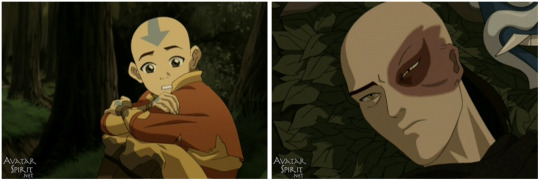
“If we knew each other back then, do you think we could’ve been friends, too?”
The first time the word “friend” is uttered between them, Aang is perched on a branch, waiting for Zuko (who is laid out on a bed of leaves the Avatar made for him) to wake up after his blue spirit rescue. “You know what the worst part about being born over a hundred years ago is?” Aang waxes, “I miss all the friends I used to hang out with. Before the war started I used to always visit my friend Kuzon. The two of us, we'd get in and out of so much trouble together. He was one of the best friends I ever had...and he was from the Fire Nation, just like you. If we knew each other back then do you think we could have been friends too?” The scene stood out for me when I first watched it for the melancholy and stillness. We are not given a flashback like we did when Aang talked about Bumi or Gyatso in earlier episodes. We have to sit with Aang’s loss of a male friend. It echoes a veteran’s loss of a war buddy more than anything a western audience would expect in a children’s show about the power of friendship. Instead of simply mourning, Aang invites Zuko into the past with him. He invites Zuko to imagine a time before the war, a land of innocence, where they could live together. And between them there is a moment of reflection given to this invitation (...until Zuko shoots a fucking fire blast at Aang).
The wistful mood returns when the two boys arrive back to their respective beds. Aang is asked by a loopy fevered Sokka if he made any “friends” on his trip, to which Aang sadly replies, “No, I don’t think I did” before tucking away to sleep. Aang’s mournful moments often stand out against his bubbly personality, but this moment stands out moreso because its the final moment for Aang in the episode. For the first time, he doesn’t receive comfort in his dejection. He doesn’t even confide in his peers. The solemnity and secrecy of this failed “friendship” is remarkable.
It’s in the next symbolic gesture that I think Avatar reveals what’s at stake in the concept of “friendship.” Zuko, in the next scene, lays down to rest after his adventurous night, looks pensively at the fire nation flag in his room, and then turns his back on it. We realize, especially after the previous revelations in “The Storm,” that Aang’s gestures of “friendship” have caused Zuko to doubt the authority of the Fire Nation.
Now all three remaining nations have misogynistic tendencies, but the Fire Nation celebrates a specific brand of toxic masculinity, and Zuko longs to emulate it even after it has rejected and scarred him. In the episode, “The Storm,” which directly precedes “The Blue Spirit,” we see how Zuko failed to replicate masculinity’s demands. In a room of men, he disregards honorifics to speak out in the name of care and concern for people’s well-being over strategy. Though the war room was all men, we later see that The Fire Nation does not exclude women from participating in this form of toxic masculinity. (Shoutout to Azula, one of the best tragic villains of all time!) This gender parity prevents disgraced men, like Zuko, from retaining pride of place above women. So Zuko’s loving act and refusal to fight his father puts him at the lowest of the low in the social hierarchy of the Fire Nation, completely emasculated and unworthy of respect.
Since then, Zuko has been seeking to restore himself by imitating the unfeeling men of the war room and his unfeeling sister, barking orders and demands at his crew. The final redemptive act for this purpose, of course, is to capture the Avatar, who’s very being seems to counteract the violent masculinity at the heart of the Fire Nation. In most contemporary Euro-American understandings, Aang is by no means masculine. He’s openly affectionate, emotional, giggly, and supportive of everyone in his life, regardless of gender. He practices pacifism and vegetarianism, and his hobbies include dancing and jewelry-making. And, foremost, he has no interest in wielding power. (@rickthaniel has an awesome piece about Aang’s relationship to gender norms and feminism).
In addition to the perceived femininity of Aang’s behavior, he’s equally aligned with immaturity. Aang’s childishness is emphasized in the title of the first episode, “The Boy in the Iceberg,” and then in the second episode when Zuko remarks, “you’re just a kid.” Aang, as a flying boy literally preserved against adulthood, also draws a comparison to another eternally boyish imp in the western canon: Peter Pan. This comparison becomes more explicit in “The Ember Island Players.” His theatrical parallel is a self-described “incurable trickster” played by a woman hoisted on wires mimicking theatrical productions of Peter Pan. The comparison draws together the conjunction of femininity and immaturity Aang represents to the Fire Nation.
When Zuko is offered friendship and affection by Aang, then, he faces a paradigm-shifting internal conflict. To choose this person, regardless of his spiritual status, as a “friend,” Zuko must relate himself to what he perceives as Aang’s femininity and immaturity, further demeaning himself in the eyes of his father and Fire Nation culture. The banished prince would need to submit to the softness for which he’s been abused and banished. This narrative of abuse and banishment for perceived effeminate qualities lends itself easily enough to parallels with a specific queer narrative, that of a young person kicked out of their house for their sexuality and/or gender deviance.
I want to point out that Aang’s backstory, too, can be read through a queer lens. Although the genocide of the air nomads more explicitly parallels the experiences of victims to imperial and colonial violence, I can also see how the loss of culture, history, friends, and mentors for a young effiminate boy can evoke the experience of queer men after the AIDs pandemic and the government’s damning indifference. In fact, colonial violence and the enforcement of rigid gender roles have historically travelled hand-in-hand. Power structures at home echo the power structures of a government. Deviance from the dominant norms disrupt the rigid structures of the empire. Aang’s background highlights how cultures based in something besides hierarchy and dominance, whether they be queer cultures or indigenous societies, threaten the logic of imperialism, and thus become targets of reform, neglect, and aggression by the expanding empire and its citizens. Survivors are left, as Aang was, shuffling through the remnants, searching for some ravaged piece of history to cling to.
We begin the series, then, with two queer-coded boys, one a survivor of broad political violence, the other a survivor of more intimate domestic abuse, and both reeling from the ways the Fire Nation has stigmatized sensitivity. But the queer narrative extends beyond the tragic backstories toward possibility and hope. The concept of platonic love proposed here, though it does not manifest until later, is a prospect that will bring peace to the two boys' grief-stricken hearts and to the whole world.

“Do you really think friendships can last more than one lifetime?”
“Do you really think friendships can last more than one lifetime?” Toph asks before the four members of the group hold hands. Since Toph previously mourned her friendless childhood, it’s easy to appreciate this line for its hopefulness regarding the four central members of the Gaang. They long to appreciate that they’re all connected. As touching as this is, the soul-mated ‘friendship’ concept is actually uniquely applicable to Aang and Zuko.
When does Toph ask the question specifically? It’s after hearing the story of Avatar Roku and Firelord Sozin: how their once intimate friendship fell apart; how Fire Lord Sozin began, undaunted, the genocidal attack on Airbenders. After recounting the tale, Aang, the reincarnation of Avatar Roku, excitedly explains to the group the moral that every person is capable of great good and evil. While that moral could easily be ascribed to many people in the series, the connective tissue is stretched directly to Zuko in a parallel storyline. Reading a secret history composed by his grandfather Sozin, Zuko discovers that he is not only the grandson of the empirical firelord but of Avatar Roku, as well. We see how the rift between the Sozin and Roku echoed down across history to separate the airbending culture from the fire nation, and, on a more human level, to separate Aang from Zuko. The two boys find themselves divided by their ancestors’ choices— and connected by Avatar Roku’s legacy.
This is what takes their “friendship” from simply a matter of the character’s preferences to something fated, something unique from the other friendships. The rest of the found family is positioned as circumstantial in their relationship to Aang and one another. Yeah, it’d be cool if they were all connected in past and future lives, but the audience receives no indicators in the series that it’s necessarily true. Only faith holds them together, which allows room for an appreciation that your “found family” friendships might simply be the trusted people you discovered along the way.
Zuko’s friendship is characterized differently. Both his struggle to befriend Aang and his eventual “friendship” are explicitly destined by the story of Roku and Sozin. After this episode, the series depends upon Zuko’s ability to mend the divide inside himself, which can only be done by mending the divide between him and Aang. Their inheritance symbolizes this dynamic exactly. As the reincarnation of Avatar Roku, Aang can be understood as the beneficiary of Avatar Roku’s wisdom (he should not, as many jokingly suggest, be considered as any kind of biological relation of Roku or Zuko). Zuko, on the other hand, has inherited Roku’s genealogy in the Fire Nation. These two pieces of Roku must be brought together in order to revive Roku’s legacy of firebending founded on something besides aggression.
In addition to making the ideals of Roku whole again, the two boys must tend to the broken “friendship” between the two men. As the Avatar and the Crown Prince of the Fire Nation, Aang and Zuko parallel Avatar Roku and Firelord Sozin precisely. The narrative of the latter pair places destiny precisely in the hands of the former. And since both Aang and Roku expressed the desire for “friendship,” it falls in the lap of the corresponding royal to give up their imperial dreams so they can gain something more peaceful and intimate. For Zuko, this now can only be accomplished when he heals the rift within himself.
Importantly, both the previous friendship and the destined friendship between Zuko and Aang are between two men. The coming-of-age genre has proliferated the trope of homosociality (friendship between individuals of the same sex) and its eventual decline brought on by maturity and heterosexual romance. (Check out the beautiful and quick rundown of classic examples, from Anne of Green Gables to Dead Poet’s Society, made by @greetingsprophet ). The story of Avatar Roku and Firelord Sozin replicates this established narrative.
We see them playing, sparring, and joking intimately with one another. The two as young adults were intimately connected, the series explains, “sharing many things including a birthday.” Eventually their intimacy is interrupted by their worldly responsibilities and the spectre of heterosexual romance on Roku’s part.
Now, It’s not a huge leap for one to wonder if Sozin longed for something stronger in their “friendship.” We see no female romantic interests for Sozin. Instead, he continues to demonstrate his platonic allegiance to Roku. When Roku prepares to leave for his Avatar training, Sozin walks into his room and gives him his crown prince headpiece, a gesture of unique devotion that positions his friendship above his politics (which harkens to Plato and EM Forster’s ideas about platonic love that I’ll discuss in Part 3).
One might note, too, how the wedding between Roku and his childhood sweetheart provides the setting for the escalation of Sozin’s violence. “On wedding days,” Sozin writes, “we look to the future with optimism and joy. I had my own vision for a brighter future...” He then pulls Roku away from his bride for a personal conversation, briefly recapturing the earlier homosocial dynamic with his friend. Sozin describes his affection for their intertwined lives. Then he links their shared happiness to the current prosperity of the Fire Nation. He imagines the expansion of the Fire Nation, which would also expand on the relationship between him and Roku. But the Avatar refuses the offer and returns to his wife, insisting on the value of traditional boundaries (both the pact of marriage and the strict division of the four nations). The abandonment of the homosocial relationship by Roku sets the site for the unmitigated empirical ambitions of Sozin. One wonders how history might’ve been altered had the two men’s relationship been sanctified and upheld. How might’ve Roku persuaded Sozin in his empirical ambitions if he had remained in a closer relationship to his friend? In their final encounter, Sozin reacts vengefully to his former platonic love: he lets Roku die protecting the home the Avatar shared with his wife. Sozin’s choice solidifies the divide between them, and makes the grief he’s experienced since Roku left him into actual death.
Instead of Avatar Roku and Firelord Sozin finding a resolution, Aang and Zuko are ordained to reverse their friendship’s disintegration. Yes, they must heal the rift in the world created by the Fire Nation’s aggression, but Aang and Zuko must also reverse the tradition of lost homosociality within a culture of unrelenting machismo. Despite Avatar: the Last Airbender’s ties to the coming-of-age genre, the arc of Aang and Zuko’s “friendship” counters one of its most prominent tropes. “Some friendships are so strong they can transcend lifetimes,” Roku says, and it’s precisely this platonic ideal that draws Zuko and Aang towards one another in ways that are revolutionary both in their world and in the traditions of our’s. To come together, as two matured boys, to form an adult platonic love that can persist into adulthood.
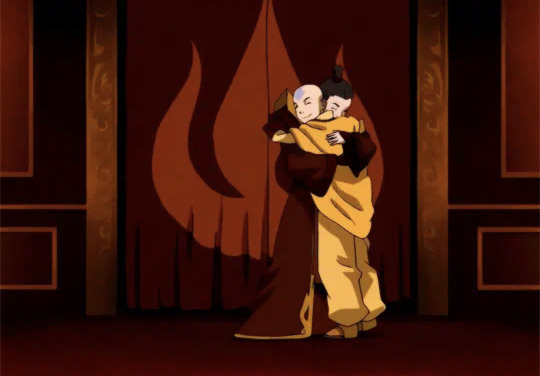
“And now we’re friends.”
Which brings us to the consummation of Aang and Zuko’s “friendship.” Having resolved their previous hostilities and having neutralized the outside forces that would rather them dead than together, Aang and Zuko can finally embrace and define their relationship as “friendship.” Now, if we look closely at Zuko’s expression, we’ll notice a pause, before he smiles and reiterates Aang’s comment. My initial response, with my zukaang shipping goggles on extra tightly, was that Zuko just got friend-zoned and was a little disappointed before accepting Aang’s friendship. When I took a step back, I considered that we are given this moment of reflection to recognize Zuko’s journey, his initial belligerent response to the idea of befriending the Avatar. When he accepts the term of ‘friend,’ he reveals the growth he’s undergone that’s brought peace to the world. With these two possibilities laid out, I want to offer that they might coexist. That the word ‘friend’ might feel to Zuko and the audience so small and limited and yet simultaneously powerful. The pause can hint at the importance of “friendship” and signal something more. This reading emboldens the queer concept of “friendship” that undergirds their relationship. That the hug that follows might be meant to define the depth of the platonic love that is at the very heart of the series.
Saving a hugging declaration of “friendship” for the announcement of peace in the series is quietly revolutionary. In the twentieth century, male characters could connect in battle, on competitive teams, and through crime. “In the war film, a soldier can hold his buddy — as long as his buddy is dying on the battlefield. In the western, Butch Cassidy can wash the Sundance Kid’s naked flesh — as long as it is wounded. In the boxing film, a trainer can rub the well-developed torso and sinewy back of his protege — as long as it is bruised. In the crime film, a mob lieutenant can embrace his boss like a lover — as long as he is riddled with bullets,” writes Kent Brintnall. Aang and Zuko’s hug starkly contrasts this kind of masculine intimacy. The show suggests that environments shaped by dominance, conflict, coercion, or harm, though seemingly productive in drawing people and especially men together, actually desecrate “friendships.” Only in a climate of humility, diplomacy, and peace can one make a true ‘friend.’
In situating the’ “friendship” between two matured males in a time of peace, the writers hearken back to older concepts of homosocial relationships in our fiction. As Hanya Yanagihara has described the Romantic concepts of friendship that pervaded fiction before the 1900s. In her book, A Little Life, Yanagihara renews this concept for the twenty-first century with a special appreciation for the queerness that one must accept in order for platonic love to thrive into adulthood. She writes, “Why wasn’t friendship as good as a relationship? Why wasn’t it even better? It was two people who remained together day after day bound not by sex or physical attraction or money or children or property, but only by the shared agreement to keep going, the mutual dedication to a union that could never be codified.” Aang and Zuko’s relationship, despite a history that would keep them apart, reclaims this kind of friendship. Their hearts, bound together by an empyrean platonic love, are protected from the political and familial loyalties that would otherwise embroil them.
In addition to Yanagihara, another author that coats the word ‘friend’ with similar gravity and longing to Avatar is E.M. Forster, who braids platonic friendship in his writing with homoeroticism and political revolution. In Forster’s novel Maurice (originally written in 1914 but published posthumously in 1971 due to Britain’s criminalization of male homsexuality), the titular character asks a lower class male lover lying in bed with him, “Did you ever dream you had a friend, Alec? Someone to last your whole life and you his? I suppose such a thing can’t happen outside of sleep.” The confession, tinged with grief and providence as it is, could easily reside in Aang’s first monologue to Zuko in “The Blue Spirit.”

Platonic love as a topic is at the heart of Maurice. Plato’s “Symposium,” from which the term platonic love derives, is even directly referenced in the book and connected with “the unspeakable vice of the Greeks”— slang for homosexual acts. For Forster, the sanction of platonic love, both the homosocial aspect and the latent homosexuality, reveals a culture’s liberation. “If I had to choose between betraying my country and betraying my friend,” Forster wrote in his essay “What I Believe,”, “I hope I should have the guts to betray my country.” This echoes a sentiment of philial love described by Plato.
Rather than revolutionary ideals, for Forster friendships, and specifically friendships that disregard homophobia, provide the foundation for peace, equality, and democratic proliferation. When Aang and Zuko embrace, they are embodying this ideal. Platonic love and the word “friend” have a history intertwined with queer romantic love, and, while I won’t argue that Avatar attempts to directly evoke this, I will suggest that the series consciously leaves room for this association.
Now, the show certainly makes no attempt to imply anything romantic between Zuko and Aang within the timeline we witness (nor any same sex characters, which reflects cultural expectations in the 2000s). And for good reason, the age gap would be notably icky, to use the technical term. (You might note, however, that the show actually allows for crushes to extend upwardly across the same age gap, when Toph accidentally reveals her affection for Sokka to Suki in “The Serpent’s Pass.”) Despite connecting queer friendships to the history of ‘platonic love,’ Avatar provides two critiques to platonic love for audiences to absorb. One is the pederasty with which Plato defined his ultimate form of love in his Symposium. Fans rightfully comment on the age gap between Aang and Zuko as something preventative to shipping them together. And beyond the fact of their ages, Aang’s youthfulness is emphatic, as I remarked earlier. Aang and Zuko are prevented from consummating their platonic love until both are deemed mature in the last moments of the series. And even then, their relationship is directed toward future development rather than conclusion. Instead of cutting away, they are allowed to exit their scene together toward a speech about hope and peace. This stands in stark opposition to the permanence of Aang and Katara’s kiss. The platonic love in Avatar, the kind EM Forster cherishes, is relegated to adulthood as opposed to other kinds of boyish friendships.
The conclusion of Avatar, at least for me, actually feels especially satisfying because it settles our characters in the “new era of love and peace.” It is a beginning, and it feels more expansive than the actions the characters choose to take in the episode. Even as our characters conclude three seasons of narrative tension as the sun sets and “The End” appears on the screen, it feels instead as if their stories can finally begin. The characters are allowed to simply exist for the first time. Yes, Aang and Katara or Zuko and Mai are allowed to embrace and kiss, but it’s because the pressures of empiricism have finally been banished. They are now allowed to try things and fail and make mistakes and explore. Things don’t feel rigid or permanent, whether that be one’s identity or one’s relationships.
Ideally, within the morality of the series (at least as it appears to us with no regard for whatever limits or self-censorship occurred due to its era of production and child-friendly requirements), “friends'' are maintained alongside romantic partnerships. Both Zuko and Aang’s separate romantic relationships blossom within the same episode that they declare their “friendship.” In fact, a vital plotline is the development of Zuko’s relationship with Aang’s romantic interest. While anyone in the fandom is well aware of the popular interpretation of romantic affection between Zuko and Katara because of their shared narrative, I have to point out that romantic feelings across the series are made extremely explicit through statements, blushes, and kisses. Zuko’s relationship with Katara can be better understood in the light of the coming-of-age counternarrative. While the love interest often serves as a catalyst for separation for a homosocial relationship, the friendly relationship with Aang’s love interest—seeking her forgiveness, respecting her power, calling on her support, etc—is vital for Zuko to ultimately create an environment of peace in which he and Aang can fulfill their destined “friendship.” In fact, we can look at Katara’s femininity as the most important device for manifesting Aang and Zuko’s eventual union. It’s her rage against misogyny that frees Aang from his iceberg, midwifing him into the world again after his arrested development, the complete opposite of a Wendy figure. It’s her arms that hold Aang in the pieta after his death in the Crossroads of Destiny, positioning her as a divine God-bearer. Afterwards, its her hands that resurrect Aang so that they together can fulfill his destiny. It will be these same hands with this same holy water that resurrect Zuko in the finale. Only through Katara’s decided blessing could Aang and Zuko proceed toward the fated reunion of their souls.
The importance of this critical relationship to femininity becomes relevant to a scene in “Emerald Island Players” that one might note as an outstanding moment of gay panic. Zuko and Aang, watching their counterparts on stage, cringe and shrink when, upon being saved by The Blue Spirit character in the play, Aang’s performer declares “My hero!” Instead of the assumption of homophobia, I wonder whether we might read Aang and Zuko’s responses as discomfort with the misogynistic heterosexual dynamics the declaration represents. Across the board, Avatar subverted the damsel in distress trope. There’s a-whole-nother essay to be written on all the ways it goes about this work, but the events in “The Blue Spirit” certainly speak to this subversion. It’s quite explicit that Zuko, after breaking Aang’s chains, is equally dependent on Aang for their escape. And, by the end of the actual episode, the savior role is reversed as Aang drags an unconscious Zuko away from certain death. To depict these events within the simplistic “damsel in distress” scenario, as The Ember Island Players do, positions Aang as a subordinately feminized colonial subject, denies him his agency, and depicts the relationship as something merely romantic, devoid of the equalizing platonic force that actually empowers them. The moment in the play is uncomfortable for Aang and Zuko because it makes Zuko the hero and Aang the helpless object. Aang is explicit about his embarrassment over his feminized and infantilized depiction in the play. And Zuko, newly reformed, is embarrassed to see, on one hand, his villainy throughout the play and, on the other hand, see how his character is positioned as made out as a savior to the person who has actually saved him.
At the heart of the series is not the idea of a chosen one or savior. Instead, we are saved by the ability for one person to see themselves in another person and to feel that same person equally understands their own soul. This is the ideal of platonic love. Platonic love between two matured boys—two boys with whose memories and bodies bare the scars of their queer sensitivities—is an essential part of the future of peace. Many fans have a sense of this, labeling the relationship as “brotp” and “platonic soulmates.” I simply encourage people to acknowledge that platonic love, especially in this context, is not a limit. There is no “no homo” joke here. When we remark on the platonic love between Zuko and Aang (and across media more generally) we are precisely making room for friendship, romance, and whatever else it could mean, whatever else it might become. While I find Legend of Korra lacking and in some ways detrimental to appreciating the original series, it’s finale interestingly parallels and extends this reading of platonic love in a sapphic vein. And most recently, She ra Princess of Power was able to even more explicitly realize these dynamics in the relationship between Adora and Catra. Let’s simply acknowledge that Aang and Zuko’s relationship blazed the trail: that peace, happiness, hope, and freedom could all hinge on a “friendship,” because a “friend” was never supposed to be set apart from or less than other kinds of relationships. For the ways it disregards gender, disregards individualism, disregards dominion, platonic love is the foundation of any meaningful relationship. And a meaningful relationship is the foundation for a more peaceful world.
*Author’s note: I’m just tired of sitting on this and trying to edit it. It’s not perfect. I don’t touch on all the symbolism and nuances in the show and in the character’s relationships. And this is not meant to negate any ships. It’s actually, quite the opposite. This is a show about growth and change and mistakes and complexity. Hopefully you can at least appreciate this angle even if you don’t vibe with every piece of analysis here. I just have no chill and need to put this out there so I can let my obsession cool down a bit. Enjoy <3
#zukaang#atla meta#avatar the last airbender#platonic love#meta#zuko#aang#plato#maurice#spop#lok#adora#catra#em forster#remember when one person said i seemed manic in the last meta i wrote???#look at me now!#korrasami#catradora#the symposium#kataang#zutara#maiko
285 notes
·
View notes
Text
A “perfect” ending?
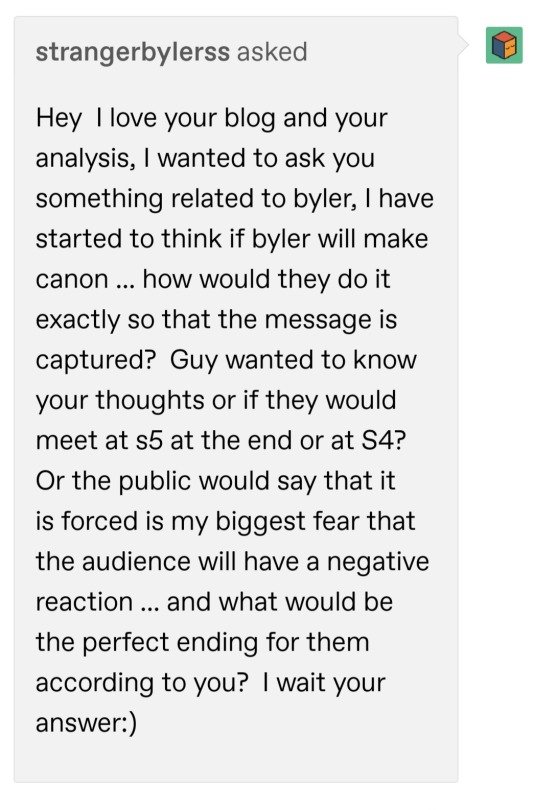
Thank you for Asking, @strangerbylerss ! I was a Tumblr amateur once again, and I accidentally tried to save your Ask as a Draft and it disappeared. Thankfully, I’ve started taking screenshots of all Asks so I don’t lose track of them so I’m replying in a post like this.
What do I envision as a “perfect ending” that the public would say is not forced that involves Mike and Will falling in love and becoming a couple? Well. As you probably have noticed, I already see Mike and Will’s strong bond as canon and as an essential part of the very structure of the entire series. I personally believe that any other ending would feel forced and as though the writers had diverged from their original plans that they foreshadowed in seasons 1, 2, and 3. But! I respect that my opinion on that topic is controversial in the context of the popular fandom understanding of the series thus far, and I am happy to describe my thoughts on the direction that the series might take next, how that might involve Mike and Will’s relationship, and what I would personally like to see addressed in the story by the end of season 5.
It is, of course, important for the writers to explore Mike and Will’s relationship from this point forward in a way that continues to be consistent with the established Stranger Things universe and any canon details that we have been given so far in the first three seasons. I think Mike and Will have quite a lot of hurdles to get through, but that those hurdles are an intrinsic part of the story and that they will be addressed in the final seasons. Whether they face their challenges together earlier on, or whether those challenges need to be dealt with before they feel comfortable admitting their feelings for each other, remains to be seen. I have a hunch, however, that the mysterious events and odd happenings with the Mindflayer are directly connected to what Will is struggling with in the story, and as such it only makes sense that in the process of confronting the Mindflayer and conquering the personal issues that Will is dealing with that he will also inevitably confront his feelings for Mike.
I trust the Duffer Brothers and the writing team behind Stranger Things to continue telling a great story just as they have been thus far. Season 4 and 5 will undoubtedly feature more monsters and strange happenings around Hawkins, the Upside Down, and now wherever Hopper is (presumably Russia) and wherever the Byers Family has moved to. I am wary of hypothesizing too far into plot-related specifics since I think that's entirely dependent on the writers' creative decisions and something that could take many different paths, but I'm happy to share a very general idea of one route that I could envision the story taking that I think could be very satisfying.
Hints and clues in the series so far suggest that Will is dealing with a lot of trauma, and I believe that there is evidence that Will is also dealing with a significant amount of internalized homophobia. Canonically, the Mindflayer is implied to be connected to Will's emotional state in some way or at the very least heavily influences it. Will is pulled into the Upside Down in season 2 when he is afraid: first while trick-or-treating when startled by the bullies in masks, and again when at school and frightened by Dart in the bathroom. Will senses the Mindflayer in season 3 while watching Mike and El holding hands on the hill as they walk home, and he senses the Mindflayer while at the movies alone with Mike. I hypothesize that these season 3 moments in which Will senses the Mindflayer are specifically triggered by Will’s intense fear and anxiety over his repressed feelings for Mike. I believe that by the end of the series Will has to confront many of his fears in order to effectively deal with the Mindflayer, and his internalized homophobia is a significant source of fear and anxiety for him. I theorize that he will have to face his feelings for Mike eventually, and that it is actually a critical part of the logical resolution of the story.
Mike, meanwhile, has his own challenges. We are led to understand that Mike has a lot of deep insecurities and wants to be loved and accepted by other people, and also very much cares about doing the “right” thing. As rebellious as Mike can sometimes act, you can tell that he values the respect of his friends and he also might feel like he needs to live up to his strict and orderly parents’ expectations in order to be loved. I might be projecting a bit here, but while growing up in a household that was very strict and had lots of rules, I often felt like if I broke a rule or if I didn’t live up to my parents’ expectations that their love might actually be revealed to be entirely conditional someday.
For Mike and Will to end up together in a way that I would consider narratively consistent with the themes in Stranger Things so far, I believe that season 4 and season 5 need to address:
Will’s trauma
Will’s severe internalized homophobia
Mike’s insecurities and his desire for love and approval
their separation now that the Byers Family moved out of Hawkins
The perfect ending, for me, would involve Will finally starting to confront his trauma and any parts of his past that are haunting him in the present, and working through his internalized homophobia and the ghost of his father’s abuse. I would hope to see Mike recognizing that even if people don’t approve of what he wants to do with his life that he will ultimately be much happier when he is honest with himself and with others about his feelings and who he is regardless of what society expects. I think that Karen Wheeler will be particularly happy that her son is able to understand this in a way that she struggled to when she was younger.
If I were to predict the chronology of certain plot-points: I might guess that in season 4 we will follow Mike figuring out his feelings for Will while in Hawkins, and that Will would be working through his trauma and dealing with the Mindflayer with El and Joyce and Jonathan wherever they’ve relocated to. Will, in all likelihood, is probably still under the heartbreaking impression that Mike does not return his feelings, that being queer means that he will never have the chance to be happy like his friends, and that he is alone and unworthy of romantic love. We might see a rather angsty contrast between Mike realizing his feelings for Will while in Hawkins and becoming more passionately confident about it, while Will is off on his own facing horrible things and convinced that Mike will never return his feelings. (The drama!) At some point, the adventures in Hawkins will probably collide with the adventures with the Mindflayer once again, and the cast will be reunited through various twists of fate. When reunited, Mike might be prepared to confess his feelings for Will but plans could be thrown awry as sinister plots unfold and antagonists gain the upper hand in the season’s latest conflict. Since it is the penultimate season, I wouldn't be shocked if they leave us with a grittier cliffhanger than even season 3 and Hopper's (incorrectly) presumed death.
I think there’s any number of ways that the writers could address the main conflict in the series while also addressing the emotional conflicts of the story and offer us a very satisfying conclusion to both over the course of season 4 and season 5. I’ve given you a peek into one of many different hypothetical scenarios that I’ve imagined might take place and that could work, but I trust that whatever route the Duffer Brothers decide to take with the story that it will be excellent.
In conclusion: the perfect ending for Stranger Things, for me, would involve Hopper, Will, El, and Mike (and everyone else!) being safe and healthy and happy and confronting their fears, their traumas, and their feelings while being honest with their loved ones and themselves about what matters most to them. And I do think this will involve Mike falling in love with his friend that went missing in November 1983, and them living a very happy life together for the rest of their days.
Thank you for your Ask!
*Edit: I realize that I should briefly address Mike and El’s former dating relationship since oftentimes fans see their rom-com drama in season 3 as the largest hurdle between Mike and Will becoming a couple by the end of the series. I see Mike and El’s dynamic, and El and Will’s eerie connections to one another, as being an intrinsic part of the emotional journey of self-discovery and self-love that Mike and Will are going through. I believe that El and Will's stories are intertwined and that they are not entirely independent from each other. I won’t elaborate in this post, but you can read some of my thoughts on Will and El’s connection to each other here and you can read my opinion of Mike and El’s current dynamic here. In short: I don’t see Mike and El’s relationship as being in direct conflict with Mike and Will becoming a couple, I actually see Mike and El’s dynamics as frequently directly supporting the theory that Mike has feelings for Will. @kaypeace21 also has an excellent write-up on the way that El and Mike’s break-up in season 3 directly parallels Will and Mike’s fight, and the way that the tone of those scenes reveal Mike’s feelings. You can read that here.
#byler#stranger things theory#stranger things#stranger things 4#will byers#mike wheeler#byler is real#byeler#byler is canon#stranger things analysis
76 notes
·
View notes
Note
How do you feel and what do you think about dabi? Endeavor, dabi and hawks have interesting connections, parallels and foiling going on. Im getting a strong theme of father figures from them
*rubs hands together*
Oh, boy oh boy, do I love the foiling of the Takami and Todoroki family legacies and all the juicy interpersonal connections and drama! It’s just - *chef’s kiss* UGH, it’s so good! Ok!
Dabi as a villain is amazing! He has arguably the most consistent and actionable motive and plan of the LoV so far. Everything about him feeds directly back into his background and his overall purpose. There are times when a character only exists to do one thing they’re just not that compelling, but Dabi is not one of those cases. He’s not only fully integrated his ugly family history into his identity and mission, it makes up the fabric for his entire character and his sole purpose. He’s relentless and ruthless in his goal, but that wouldn’t work so well if it wasn’t for -
Endeavor who serves as both his tragic origin story as a horrible father and potentially his tragic end as a regretful, changed man. Endeavor has never had to sacrifice or break his character to change as much as make slow, individual decisions that are slowly beginning to add up. He’s genuinely repentant of his past sins and is trying to reinvent himself, and his horror and agonized reaction to Dabi’s reveal is consistent with that. But that also doesn’t mean he can just wallow in his pain over what his actions have caused. He’s made the decision to *be* better, period, so he can’t just roll over and die without a fight when others need his aid because it would undermine and betray the promise he made to his youngest son to try and succeed as a hero where he failed as a father. That ties in nicely to -
Hawks, whose only real identity lies in his work as a hero - and a hero inspired by Endeavor, no less, born out of an impression that Endeavor was a good person to be emulated unlike his own father who stole and killed to the point Hawks can’t use the name he was born with for fear of being burdened with his own father’s sins. I very much have the impression that as a kid he looked up to Endeavor and said to himself, “He may be rough around the edges, but that’s what a GOOD man looks like. I wish he were MY dad!” He hates Dabi as this antithesis of his ideals as a hero, and to come find out that both of them stem from the same man on an ideological level, but Hawks had built his identity on lies from the very get-go is going to strain his relationship with Endeavor and maybe his own philosophies as a hero - which brings me nicely to -
Shouto, who I haven’t said recently, but have had a long-held suspicion is the final mirror in a series of reflections the “top 3″ of Class - 1A are for the top three heroes at the start of the series. (Deku for All Might, Bakugo for Endeavor, and Shouto for Hawks. Come on, Horikoshi, please prove me right!) Shouto has had a chance to face these conflicting realities in his upbringing before being “full-formed” as a hero and steer his own destiny where Hawks will likely have to reinvent himself from scratch on some level. That doesn’t mean he isn’t going to be facing the same kind of scrutiny in the public as the son of an evil man, and could be instrumental in helping Hawks overcome that struggle he’s about to face as well as the wrestling he’ll do internally coming to grips that Hawks’ father had no bearing on who he is outside of providing motivation to make his own choices and identity as a separate entity from his father.
Some of this is still speculation, but I hope I’m reading the breadcrumbs right, because if I am this will be an amazing, self-contained story of making/breaking generational curses and reinventing oneself in the face of it.
26 notes
·
View notes
Note
Teen Wolf + Top 5 Chris moments
AWWW YISSSS. CHRISSSSS.
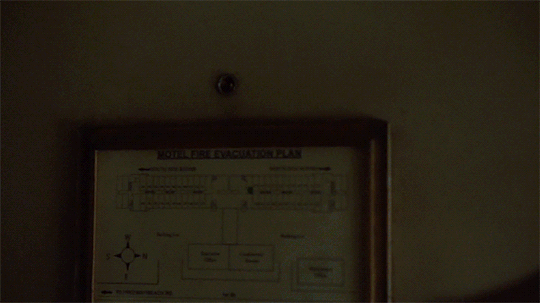
GET READY TO RRRRRRRUUMBLE.
1. Season 6 - Episode 14
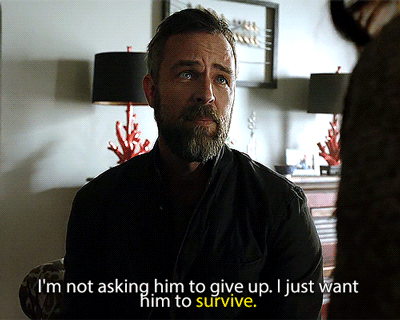
The character development is just... *chef's kiss* SPECTACULAR. Chris goes from threatening and intimidating and hating Scott - and all of his friends, especially the supernatural ones - in Season 1 to begging Melissa McCall to convince Scott and his friends to flee Beacon Hills in Season 6, so that they will be safe from Gerard and Monroe's angry, growing army of hunters. This particular line is also a beautiful parallel - Allison similarly tells Scott after she finds out he's a werewolf that she doesn't want him to be normal... she just wants him to survive - and verbal expression of Chris' new mission to protect the pack Allison died fighting for. By Season 6, Chris is ready and willing to die to ensure that Allison's friends don't, and just thinking about it makes my heart ache with pride and love for this wonderful man and his redemptive journey.
2. Season 3 - Episode 19

This is the scene wherein Chris' hunter, us-vs-them mindset really begins to change. The seeds have already been sown prior to this moment (we've watched him grapple with internal conflict caused by being confronted with the consequences and implications of his upbringing before this), but when Derek Hale, someone he has seen as an enemy - whose family he has seen as the enemy - for so long, bodily shields him from harm during a bomb blast? Chris has already been painfully reminded of his lack of familial love - his father tells him to his face in the previous season that, when it comes to his own self-preservation, Gerard would kill his own son to survive - and we never see anyone protecting Chris (he's always the protector) or doing anything selfless on his behalf... until this scene. It's in this moment that Chris really begins to question the very fabric, foundations, and fundamentals of his belief system, morality, and ethics. This scene - paired with Allison's death a few episodes later - is a pivotal moment in his character arc, akin to someone switching the tracks to redirect a wayward train.
3. Season 6 - Episode 20
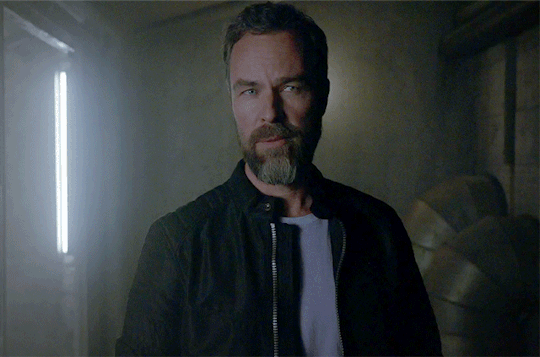
THIS SCENE. SO SATISFYING. Chris FINALLY turning his back on his toxic, evil father and sister once and for all, walking away from the Argent family armory and leaving them there to destroy each other with claws and gunmetal and wolfsbane, all that remains of the arsenal and artifacts of a now-defunct family dynasty and legacy. At first, I was a little disappointed, because I wanted to see him shoot Gerard and Kate and get that closure, but the more I think about it, the more I realize how much better it is that he doesn't even have to kill them himself; they literally tear each other apart, which is deliciously symbolic, as Gerard has just accused Chris of figuratively tearing their family apart. Oh, the irony. Chris was the only thing holding the Argent family together - I think he had been for a long time - and as he walks out of that room, leaving behind what remains of his family - and their horrible legacy - the metaphorical castle comes violently crumbling down behind him. The whole scene is just so magnificently poetic, it gives me chills.
4. Season 6 - Episode 19
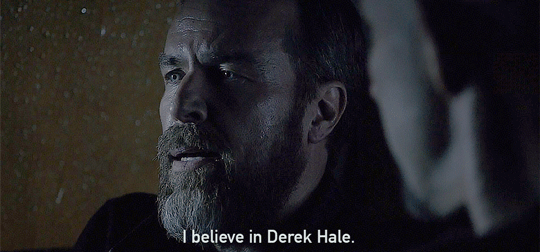
The CHARACTER DEVELOPMENT. Sometimes I just think about it and cry. (Plus, watching Chris disarm himself is highly entertaining. Also lol @ him trying to explain to the guy that, yes, Derek can turn into an actual WOLF, but, you see, he really likes sports cars... so trust me, he DROVE.)
5. Season 2 - Episode 12
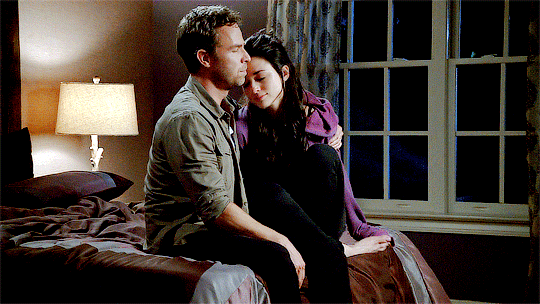
I love how tender and caring he is with Allison, especially in this scene. Despite the coldness, callousness, and evident emotional abuse (brainwashing, being trained to kill from a young age, his father withholding love, etc.) he endured growing up, his true, nurturing nature shines through in these sweet father-daughter moments, and it's breathtakingly beautiful to me that this man is still so full of love, in spite of what he has suffered, and so deeply determined to ensure that the cycle of abuse and violence stops with him. He would do anything to protect his daughter - which sometimes causes problems in and of itself - but his bottom line is always Allison's safety (which also sometimes means stepping in and saving her from herself) and you can tell that she feels safe with - and loved by - him.
Runners-Up: Chris betraying Gerard to help Scott and the pack; Allison telling Chris that she loves him and is proud of him, proud of both of them; Chris' Wild West shootout with the Ghostrider and the subsequent McArgent smooch; every damn time Chris makes a grand entrance, guns blazing, but most ESPECIALLY this one...
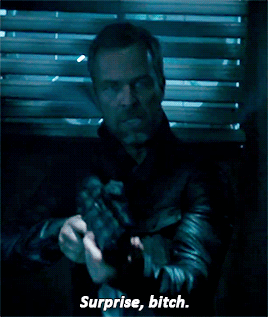
...or every time he does something ludicrously sexy and badass, like this...
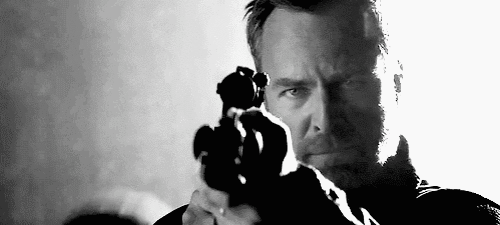
(Once again, I stuck with "serious" scenes for this list, because they tend to be the most meaningful, but there are also so many funny ones that didn't make the cut: Angry cake, passive-aggressive windshield washing, etc. Fortunately, some of those are included in the Top 5 Passive-Aggressive Moments post I already did. Maybe I'll do a separate Chris post just for kicks; we'll see.)
Send me a show + my top 5...
#angel in a big blue box#answered ask#tv shows#chris argent#teen wolf#this is my design#and the meme goes on#fictional characters#meta
14 notes
·
View notes
Text
“Autopsy of Jane Doe”[ IFC MIDNIGHT, 2016] [Rated R]
(Review & My Parallel Film Theory)
(NSFW CONTENT AND POTENTIAL SPOILERS)
(Written by Stella, edited by Jacob J.)
No matter the genre, the independent film industry holds many hidden gems within it. Studio IFC has been in the game for close to twenty years now, but it wasn’t until 2010 that it unveiled its plans for their “Midnight” collection and genre.
“Many of our most successful VOD titles are those that might fall under the Midnight label – not just films that are straight up horror, erotic arthouse, or genre films, but also ones that shock audiences, push boundaries, and stir up controversy – so officially creating IFC Midnight was the logical next step,” President of IFC Entertainment Jonathan Sehring in a statement. (SOURCE: indiewire.com // HERE)
But the focus in this article will be solely on the horror genre, specifically the 2016 supernatural/horror/thriller standout The Autopsy of Jane Doe. My review, thoughts, and analysis will include some changes I would have made to change the story itself. Now, full disclaimer, my changes and reimagining will not affect my rating on the film overall, per se.
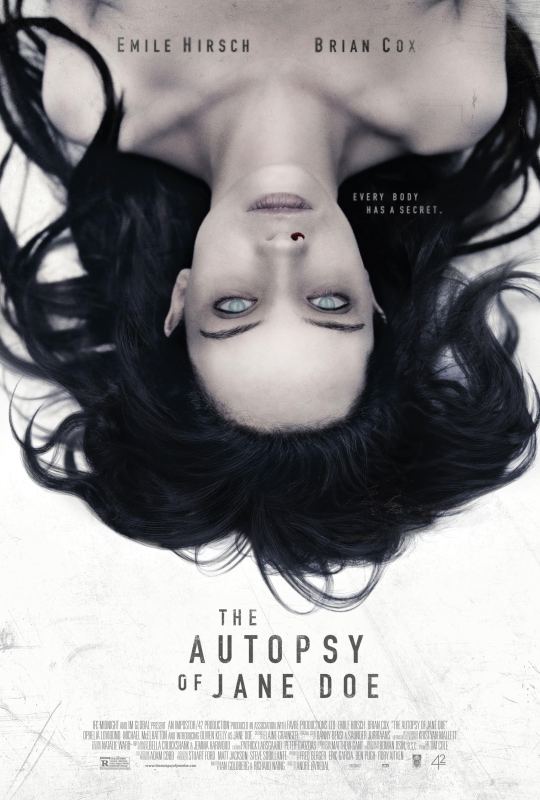
-------------------------------------------------
[REVIEW]
One thing that was honestly a surprise (albeit a pleasant one) was how small the cast actually was. Whilst there are ten actors and actresses listed on the IMDb page, the film focuses on only five of them, eventually whittling the action down to three. My honest thought? “With such a small amount of people only being focused on, this will get boring quickly.” But boy, I was 100% wrong in that assumption. If ANYTHING, it only intensified every moment on, Add in dramatic references, film scoring, and film aesthetics? It was just icing on the creep cake.
---------------
Let’s begin with the cast and breakdown of the story:
Brian Cox and Emile Hersch as father-son coroner duo Tommy and Austin Tilden
Ophelia Lovibond as Emma, Austin’s girlfriend
Olwen Kelly as Jane Doe
Michael McElhatton as Sheriff Burke (an albeit brief focus)
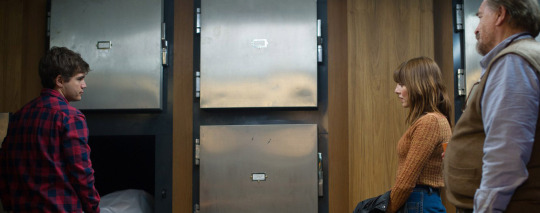
Left to right: Austin, Emma and Tommy (Screencap, Autopsy of Jane Doe, 2016)
~~~~~~
From the beginning of the film, you are immediately immersed within a brutal crime scene. It seems fairly straightforward in what appears to be a triple homicide. I was taken by (delighted) surprise that it kicked off at such a fast pace, so much so that I physically felt that I’d lost my footing (while sitting). But as the police and forensic team further search the home for evidence, they wind up finding a pristinely preserved and very nude corpse, one only partially covered in dirt down in the basement. This new revelation doesn’t fit what they’ve pinned down to be a homicide.
Enter a quieter and uneventful small town setting. Here we are introduced to Austin and Tommy Tilden, running a very small coroner business out of the basement of their home (blasting rock and roll from the radio whilst they do their job—a very cool touch.) Austin comes off as a young adult who doesn’t want to be stuck in this small town, let alone in this profession. He feels bad since father Tommy is otherwise alone and widowed.
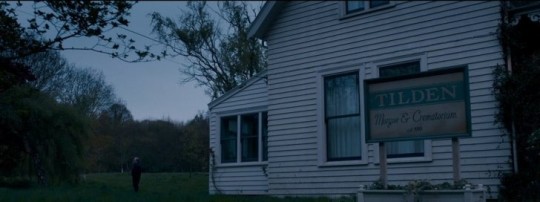
The Tilden home/business (Screencap, Autopsy of Jane Doe, 2016)
~~~~
Austin’s girlfriend Emma comes in to pick him up after his shift for a date they had planned. (This part plays into my reimagining later.) Emma sneaks up to scare Austin, then begs and pleads with him to let her see a dead body and what they do for a living. Austin flat out refuses, but then his dad allows Emma to pick one to view. Tommy also explains that they keep bells around the ankles of some corpses (a practice with origins in an old wives’ tale: if the person isn’t dead, the bell will jingle). Austin gets back at Emma by ringing the bell on one of the bodies to scare her, and she threatens that he “won’t be getting laid.” (Emma comes off as a very strong type—and not in a flattering chemistry way)
Just as they’re about to leave for their date, Sheriff Burke comes in with an urgent request: they have 24hrs to perform the autopsy of the Jane Doe found in the opening scene. Austin decides that, with the urgency and his guilt, to stay behind and assist, asking Emma to come back later.
As they perform what they thought would be just another autopsy to find clues as to how or why Jane Doe met her end, things get very eerie and strange. These events elicit goosebumps: from a shift in music to a creepily upbeat version of the McGuire Sisters’ 1954 song “Let the Sunshine In,” to an awful storm coming in seemingly out of nowhere, knocking a tree into the cellar exit, trapping the Tildens inside. The family cat gets killed. The bodies in the morgue awaken. The power goes out. These usually run-of-the-mill supernatural tropes are 100 times more dramatic with the focus only on the two men.
While they examine Jane layer by layer, her fingerprints are nowhere to be found in their system, and her trauma and, injuries in total, do not seem to match up with the crime.
Peat soil from “up northeast” found under her fingernails
No outward visible signs of marking or bruising
Broken wrists and ankles
Ripped out tongue
Mutilated genitalia
Missing tooth (which was force fed to her in a cloth with a ritualistic sigil in it)
Flower with paralyzing properties (and not native to the area) in her stomach
Horribly burned lungs and internal organs covered in scar tissue.
A very much active brain
Roman numerals and symbols carved into her skin
Markings on the cloth alluding to Leviticus 20:27 (which condemns witches) and the year 1693 (a reference to the Salem Witch Trials)
Austin and Tommy do not come out of this unscathed—or alive, for that matter. While trying to escape in the elevator when being chased by one of the belled-up corpses, Tommy hacks away at it in the dark. But, once the power comes back on, it is revealed to be Emma. Tommy gets attacked by unseen forces (since he is the one primarily performing the exam). They finally reveal that Jane Doe was likely thought to be a witch during the Trials, but the people who performed the ritual were horribly wrong—and ended up turning her into the very thing they sought to destroy. Tommy pleads with the witch to take him as long as she leaves Austin alone, and all of her horrific injuries get transferred to the elder Tilden, leaving Austin to put his father out of misery. Austin, however, gets spooked by a hallucination (provided by Jane) of his dead father on the stairs leading up to the exit. He falls and snaps his neck.
The next day, Jane Doe is in pristine form on the exam table. The Sheriff cannot understand what could have happened since he’d known the Tilden’s for so long, and decides to send Jane off to the next county. The ending features Jane being transferred into the van, a creepily upbeat song playing once again.
All in all, if I were nitpicking, the only real complaint I’d have is that some of the suspenseful moments were drawn out a few seconds too long. On top of that, they shouldn’t have killed off the family cat, Stanley. That said, if you’re into supernatural thrillers or just looking for a film for date night, this would certainly be one to consider.
(7/10 stabs) 🔪 🔪 🔪 🔪 🔪 🔪 🔪
(Reimagining AHEAD)
▬▬ι══════════════ι▬▬
Now after watching the film, I got to thinking. This is my reimagining of sorts, and a theory that they could have used to cash in on a continuation:
Let us rewind a little bit. Remember Emma? Think back to this scene specifically:
youtube
(I do NOT own the rights to this clip, simply sharing for viewing to set the scene)
༺═──────────────═༻
In this parallel theory there are a few points of change that come to mind initially:
1. Tommy has a more stubborn personality, absolutely and flat out refusing to let Emma see the cadavers
As he (Tommy) shoos Emma out, that is when the Sheriff urgently brings in Jane Doe. Austin convinces his father to let Emma stick around. Tommy then has the attitude of, “If she wants to see a dead body we’ll let her see the entire process.”

Jane’s body gets taken into the Tilden’s business. (Screencap, Autopsy of Jane Doe, 2016)
Whilst the Tilden’s are performing the examination, Emma begins to get bored (before shit gets weird and they essentially awaken Jane’s warnings)
2. When things slowly proceed to get horrific, the further that they get into things, Emma touches the ritual cloth that was used to force-feed Jane her molar, then Austin scolds her for touching evidence.
Progressively after touching the ritual cloth, Emma begins to get very sick. This not only adds an anxiety-inducing level of conflict on top of having to deal with Jane Doe’s unfolding evil, but also provides a deeper layer to the film.
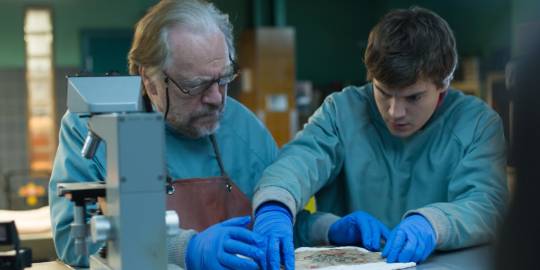
Austin and Tommy examine the ritual cloth. (Screencap, Autopsy of Jane Doe, 2016)
The more that they poke, prod, and try to fight Jane, the worse Emma’s condition gets. Austin has to drag her along whilst also trying to protect his father from the witch’s attacks.
3. You get to the point of looming dread when it becomes clear that Austin cannot save his father, and seemingly Emma as well. (Also fuck it that the cat stays alive and alerts Austin of danger, cause why not?)
After Tommy begs Austin to kill him once all of Jane’s injuries transfer to the elder Tilden (VIEW HERE); Emma’s eyes become clouded like Jane’s.
While Austin tries everything that he can to keep Emma comfortable, he tries to perform a ritual himself to destroy the evil brought in.
4. For Austin’s final attempt, he burns Jane in the incinerator.
Jane Doe is far from done causing harm and suffering. When she is burned, Emma takes her place. Seemingly, her magic makes the sheriff believe that Emma was the one that was brought in.
Tommy’s death is made look like a suicide.
Since the Tildens only had 24 hours to solve this case, the Sheriff understands that Austin couldn’t get the job done due to the loss of his father. But rules are rules, and he’s forced to transfer Jane Doe’s (now Emma’s) cadaver to the next county.
While she’s being taken out and Austin is being asked protocol police questions, the eerie song plays on the radio.
5. Austin knows that he has to hunt Emma’s cursed body into the next county. (And takes the cat with him, because the cat didn’t need to die.)
■□■□■□■□■□■□■□■
Who would LOVE to see a sequel like this?!
#film#film theory#film thoughts#autopsy of jane doe#2016#ifc#ifc midnight#horror#horror film#horror movies#horror reads#horror review#conspiracy theory#film review#movie review#review blog#review#creepy#spooky#highly reccomend#i reccomend it#independant film#indie#indie films#female blogger#blogger#new blogger#new blog#essay#horror aesthetic
9 notes
·
View notes
Text
Top 10 Reveals I’m Excited for in My Hero Academia
mysterylover123
Now first let me clarify what I mean by reveals: There are basically two types of reveals in the story, the Mystery and the internal reveal. Internal reveals are when a character learns something the audience already knows. There is a lot of hidden information I want the characters to learn about, as well as mysteries even the fans don’t know yet.
Also spoilers up until the most recent manga chapter!
#10. JUST WHAT IS BAKUGOU’S HERO NAME?
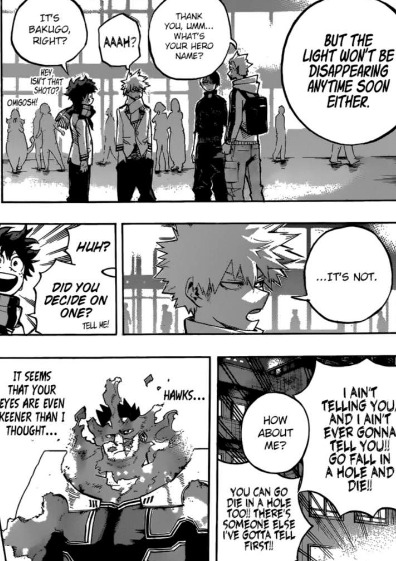
The fandom has written approximately 20,000 different meta on the question of just what Lord Explosion Murder’s real hero name will eventually be. Recently, Katsuki confirmed that he does indeed have one and has “someone he needs to tell”. Whozat? What is the name, dammit? The answer to this one is probably coming pretty soon, since it’s been brought up in-universe, but we’re all getting pretty impatient to finally learn what it is.
My theory: A play on Bakusatsuo/Ground Zero, or a play on Kacchan that connects the latter to his future goals. The person he wants to tell is...Jeanist! (sorry, Bakugou).
#9. THE LOV’S POWER-UPS
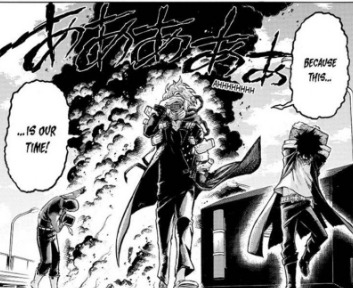
This one’s an internal reveal. Namely, the League has Overhaul’s bullets, the Meta Liberation Army, Gigantomachia and an army of high-end Nomus....but no one knows about this besides the PLF. The kids at UA don’t know. The Pro heroes and cops don’t seem to know, the public as a whole has no idea what a nightmare is brewing behind the scenes for them as the League plots and plans. It’s about time they all learned just what a powerful, dangerous force they’re truly up against in spectacular, horrifying fashion.
My Theory: The League will use their resources (the bullets) to wipe out the Top 10 Pros by erasing their quirks in fights with all their warriors, but the UA kids interning with the Pros will hold their own, showing some hope for the future of heroism.
#8. HAWKS=TRIPLE AGENT=JEANIST KILLER
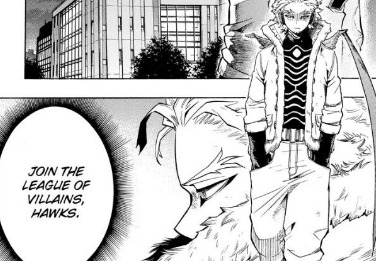
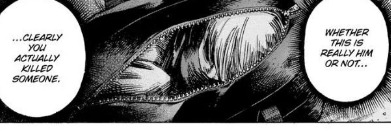
Another internal reveal, though mixed with a few audience reveals. Namely, did Hawks actually kill Best Jeanist or is this some kind of a bluff? Hawks’ status as a triple agent is something that can serve for some pretty dramatic revelations later on in the narrative - mostly for Endeavor, Tokoyami, and Dabi, learning about his various statuses and having a big “You? No, it couldn’t be!” moment. This one will probably also come soon; he’s been teetering on the edge for way too long.
My Theory: Hawks’ reveal will come during the aforementioned LoV attack arc, and this will initiate the reveal of Kacchan’s hero name. Basically, the first 3 all tie together into a potential future arc that may be coming up sooner than we think. And tie into the next one...
#7. DABI=?
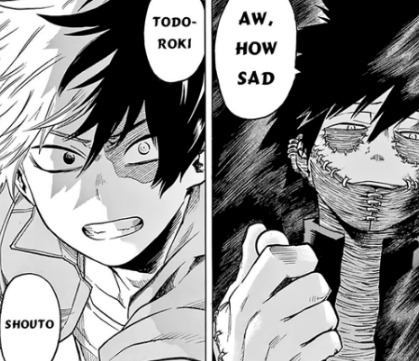
This one is a big mystery, and one that pretty much the entire fanbase has a solid theory on the answer to. Basically, if Dabi is not somehow Toya Todoroki then we’ve all got nothing. The most prominent LoV member to have received no backstory flashbacks in the MLA arc and no real name during the Hideout Raid, the mysterious firebender is a giant enigma...and yet everything about him dovetails nicely with the theory of him being a re-animated version of the allegedly dead Todoroki sibling. He even looks like Toya, so odds on this one are pretty high.
My Theory: The Toya reveal could come out in this very next arc, given all the Nomu/long lost friend drama of the recent chapters and the Todoroki angst arc of the previous ones. Otherwise, it’ll probably wait for a while to finally be unveiled. And the impact on Endeavor and Shoto will be devastating.
#6. WHAT ARE THE OTHER 5 QUIRKS?
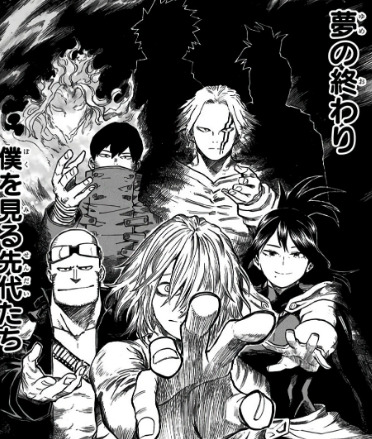
Unlike the Avatar state where we know all the powers ahead of time, Midoriya’s future quirks inside of OFA are a complete mystery. Aside from Super Strength and Black Whip, what are the other 5 wielders’ powers? The fact that we have no answers on this one at all yet is really baffling to me, because DIDN’T ALL MIGHT AND GRAN TORINO KNOW NANA’S QUIRK?!!?! Why hasn’t All Might told Deku what quirk he’ll be getting from her yet? We need this information, dude! Also why does one of the silouhettes look like Bakugo? Are you an immortal timelord Kacchan?
My Theory: I think Nana’s quirk must be related to Tomura’s (Maybe a reversal of decay, like a healing power?). As to the other 4, those are complete mysteries. Maybe super senses, some kind of shield, an elemental power, and a wildcard quirk?
#5. TENKO=TOMURA=NANA SHIMURA’S GRANDKID
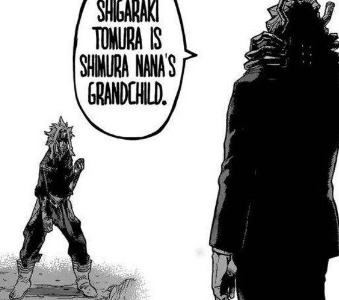
This is a great big internal reveal that I’m really impatient for more information on. Namely: 1. All Might needs to tell Deku that Tomura is Nana’s grandson. 2. Tomura needs to find out that his grandmother was All MIght’s Master, and 3. to find out that her spirit exists within Midoriya. All of this needs to go down, because that big fight between Tomura and Deku we have to get eventually is going to need some more personal stakes, and anyway why doesn’t Deku know this yet already? Tell him All Might! He needs to know!
My Theory: All Might will tell Deku, who will let this info slip at a crucial moment when fighting Tomura, calling him “Tenko” maybe at some point; this reveal, which Deku will cop to, will send Tomura into a self-searching spiral.
#4. WHO IS DEKU’S DAD?
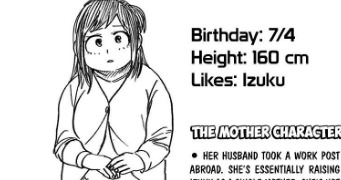
It’s pretty much grand Shonen tradition for the protagonist to have a completely absent dad, whose identity becomes a major reveal later on in the story. Deku’s dad is perhaps the most absent father in all of fiction, as we have almost zero information about the guy and Deku never even thinks about or mentions him. There are many, many prominent fan theories about who he is, and technically just a brief picture, appearance and characterization would do the trick, but most fans are convinced he must be someone important.
My Theory: Dad for One theorist here. Plenty of evidence/potential reasons it could be true to work with. All for One has some kinda plan that relates to Deku and OFA, and the reveal will come then.
#3. UJIKO=TSUBASA=AFO’S DR=DEKU’S DR?!?
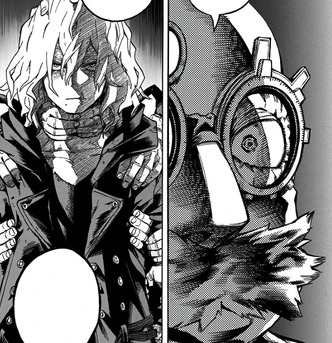
One of the biggest reasons I’m a Dad for One theorist is because of AFO’s doctor being Deku’s doctor from Chapter 1. Ujiko, the mad scientst of the League, is Dr. Tsubasa. He took his relative, Kacchan’s childhood friend, and turned him into the winged Nomu that kidnapped Deku during the Hero Killer Arc. Right now he’s turning Tomura into a butterfly or something. Deku and Kacchan need to learn about this connection, and dole out some sweet justice to this guy. (BTW is it my FMA eyes or does he look a lot like the gold-toothed doctor?)
My Theory: Dad for One hired him to supervise Midoriya, and deliberately picked Tsubasa as an experimentation subject to punish him for picking on Deku (which is also why he’s so cool with going after Bakugo), and Deku and Kacchan will find out by seeing him during a future LoV confrontation.
#2. WHO IS THE UA TRAITOR?
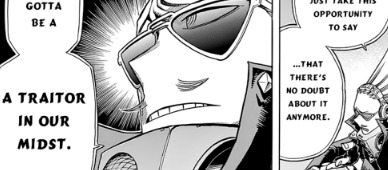
The golden question, indeed? Who, exactly, is the UA traitor? Is there a traitor? How did the league find them if not? Is it confirmed there is a traitor, most likely? And if so, who is it? There are so many prominent theories as to who it could be and how this would impact the story; I’ve read decent arguments from all over the board for every single possible candidate, and while there are plenty that have some solid evidence, only one really appeals to me from a characterization standpoint.
My theory: I’m down with the Uraraka traitor theory, because I love the idea of what it could do with her character, the ways it could affect her relationship with Deku, and the possibilities of the Toga/Ochaco parallels. Of course, I’ll be happy as long as it makes sense and crafts some good drama.
Hon Mentions: Eri will learn Nighteye died (she still doesn’t know); Other characters learn Todoroki’s backstory; Kirishima learns he and Mina fought Gigantomachia; Just freaking tell him you like him already Uraraka
#1. DEKU HAS OFA
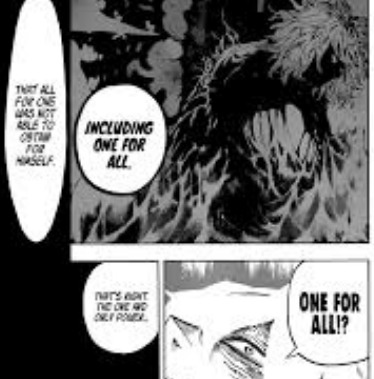
This seems like a strange thing to list as a “Reveal”, since Deku got OFA in Chapter 1. But when I say this, I mean Other characters learn about it. Obviously, Kacchan already learned and that was great. So think of the possibilities of other characters finding out! In order of who needs to know: 1. Inko, 2. Tomura, 3. Mirio, 4. Todoroki and his family, 5. Uraraka, Oddly enough, the series could probably progress with nobody but Tomura out of that list learning the truth, but still, the possibilities of the drama worth exploiting from the 9th wielder reveal are almost endless. It’s a bomb under the table waiting to go off to craft neat conflict in the future.
My Theory: Tomura and Ujiko know about OFa. They’ll tell PLF and go on a hunt for the 9th wielder among the likely candidates at UA; the first years and Lemillion, Nighteye’s intern. In the process they’ll figure out it’s Deku and the truth will be revealed to all pertinent characters, making Deku the target of PLF trying to harvest OFA for their own control.
#my hero academia#midoriya izuku#katsuki bakugou#bakugou's hero name#tomura shigaraki#shigaraki tomura#hawks#mha hawks#best jeanist#one for all#all for one#nana shimura#tenko shimura#ua traitor theory#dad for one#ujiko
312 notes
·
View notes
Text
What TWN Fucked Up
I think if I wasn’t in love with the book series, the show would be fine on its own. It’s an interesting world, the fight scenes are great, the music is wonderful, and the cast is doing well with what they are given, ESPECIALLY Joey Batey. That said, I’m going to be frank: they fucked ALL of the characters.
Let Them Be Funny You Cowards
I’ll actually start with Jaskier/Dandelion.
In the show, Jaskier makes some appearances where he didn’t in the books (Pavetta’s engagement ceremony) for one simple reason: he’s the comic relief. This does a disservice both to Jaskier AND the other characters. The games also tended to do this, but I think it’s even more apparent in the show.
It’s bullshit for 2 reasons:
1. the rest of the characters are SO FUNNY. Geralt is really funny! Yennefer is fucking hilarious. Ciri is a little shit! Triss is funny! Calanthe is funny! Regis is funny! Yarpen Zigrin is funny! Zoltan is funny! Philippa is funny! Everyone’s humor might be dry, or witty, or smartass, but the characters are funny, let them be funny.
2. Jaskier is not JUST funny.
Jaskier is a fun and creative character but the biggest thing that makes him unique is the contrast of how he says how he feels while everyone else hides. Jaskier is very open and tends to lay things out on his sleeves. He’s very aware of his own feelings and urges and emotions and by extension, is very aware of what others are not saying. Everyone else hides.
Yennefer, Geralt, Ciri, Triss, Calanthe, Cahir...all of them hide their thoughts and feelings.
Feeling vs Expressing
This nuance is almost entirely absent from SO many of the characters. The most glaring example is--of course--Geralt. A lot of the adaptations fuck it up, the difference between FEELING and EXPRESSING.
Geralt is one of THE MOST emotional characters in the Witcher. He’s very introspective, he feels very deeply, he struggles with internal conflict CONSTANTLY, but he isn’t GOOD at expressing it. That does not, for fuck sake, mean it isn’t there.
I recognize that a book gives us the luxury of knowing Geralt’s thoughts, but not showing signs of his internal combat and the feelings radiating off of this man is a complete disconnect from his character. This brings us back to Jaskier. Jaskier knows Geralt better than anyone and is constantly a wall for Geralt to play his emotions off of. When Geralt is closed off, Jaskier picks up on it. When Geralt does better at expressing himself, he does so and Jaskier listens. When Geralt tries to lie, which he is canonincally bad at, Jaskier calls him out. Jaskier can read him like a book, so there NEEDS to be signs shown to the audience about his emotions.
Geralt Is A Liar Sometimes
Adaptations need to learn or at least show that they know that Geralt is a massive liar about himself all the time. Geralt says he has no emotions but is one of the most if not the most emotional character in the series. Geralt says he can’t feel love but he falls in love with Yennefer after she kicks his ass, loves Ciri when he meets her in the woods, quickly loves Jaskier, loves the hansa, and has a love of people in general.
Geralt SAYS he doesn’t need anyone, because he has faced so much rejection. Geralt wants love and acceptance but is turned away consistently. He was rejected as a child, gets rejected by the people he saves, by townsfolk, by kings, and allies, and strangers. He SAYS he has closed himself off, but his constant drive to help people shows that he. is. a. liar.
Sides of the Same Coin
Which brings me to: Geralt vs Yennefer. They parallel and contrast one another beautifully and oh ho ho does Netflix fuck that up. Yennefer is also a massive liar, but very importantly: she is much better at it than Geralt. Like Geralt, Yennefer faced constant rejection and was taught that she is unlovable. She similarly has trust issues, buries herself in her work, and suggests she doesn’t need anyone when in fact she too is desperate for love and acceptance.
BUT! while Geralt is woeful and keeps desperately trying to help and care for others, Yennefer has decided that she would become more powerful than those who would seek to hurt her and make them regret trying to take advantage. Geralt sets himself up for abuse hoping that someone will surprise him, Yennefer has lost patience and will not let people hurt her anymore. She uses her looks and connections to her advantage, but punishes those who underestimate her. She’s ruthless. She very easily could have been made a villain, but doesn’t become one, for the same reason that Geralt keeps trying to help: she’s a loving person.
She is loyal and protective of those she cares about. She has gained immense power and is cutthroat with it when protecting herself, so god help anyone who threatens the people she cares for.
Father, Daughter?
Something crucial to the Witcher series is that the novels are CIRI’S story, not Geralt’s. However, their relationship is the most important one in the series. Geralt’s first mini intro with Ciri is when she is 6. He is supposed to come collect her, but cannot bring himself to. They meet again when she is 10, after she has run away. She’s a snotty spoiled princess, but still a child. Geralt warms up to and protects her. When he learns who she is, though, he is afraid of her falling victim to the death and destruction that follows him, and he leaves her behind in the care of Moussack, who will take her back home.
The next time they meets is after the fall of Cintra. Geralt learns of and mourns the death of Calanthe, and beyond the wreckage of this destroyed city is Ciri. She survived and escaped and has crashed back into his life again. This time he CAN’T ignore Destiny. The significance of their repeated meetings over her formative years builds a crucial foundation to their relationship. They are tied by Destiny, but BECOME FAMILY by FORMING a relationship.
Cahir, the Manchild
If I had a dollar for every time a piece of media in the last ten years thought you could have a character do the most monstrous things and be forgiven so long as he was sad about it, I’d have enough money to get counseling for watching what they did to Cahir.
Cahir Mawr Dyffryn aep Ceallach, when first introduced, is hidden behind a mask. As 10-11 year old Ciri watched everyone around her get slaughtered, this man (a teenage boy) pursues and catches her. She manages to escape him, but knows he is after her and haunts her dreams.
A small child’s memory of a man in armor chasing her builds this idea of Cahir as a terrible and imposing figure, but he is essentially Zuko from Avatar: The Last Airbender. He is a young boy, skilled in battle, not yet a man, but with the weight of his family and country on his shoulders. He is not evil, just driven by his country’s imperialism and is terrified of failing (and being killed by) those that preside over him.
He kills in battle and is furiously hunting down Ciri. He is on the wrong side, is a tool of those that ARE evil, but this boy thinks what he is doing is right. After having not committed aggressively heinous activities, this boy comes face to face with Geralt. Cahir knows he will be killed if he doesn’t succeed in catching Ciri for his country, and his family would be shamed and/or killed for his failure. While fighting, his helmet is finally removed and Geralt, in a position to finish him off, realizes this is just a boy, barely a man. Cahir was wrong, but he deserves to be pitied for being taken advantage of.
From then on, Cahir’s story is about redemption. He earned the right to even START this arc by being a naive and manipulated child. The show making him significantly older and eager to participate in cruelty absolute FUCKS AWAY any chance to sell this story of misguidedness and the redemption and forgiveness that follows.
So yeah, uh, fuck all this.
124 notes
·
View notes
Text
TBATD Chapter 21 Note
~spoilers abound~
So here’s the thing about this ending:
I’ve had it planned from, essentially, the moment I came up with this AU.
I’ve been second-guessing it since that moment.
My personal struggle with this chapter (and, to some extent, the previous three) is because the focus of the plot shifts somewhat--for most of the fic we’ve been firmly with Katara, on how she adjusts to her life in the Fire Nation and her relationship with Zuko. And now the culmination of the plot is essentially on Zuko becoming Fire Lord and Aang becoming the Avatar--which, to be fair, is what happens in canon, too. In my version, Katara also doesn’t technically win her fight with Azula. And up until literally five hours ago, she didn’t fight Azula, because I assumed that Aang would go into the Avatar state in a rage the moment Katara was threatened with lightning, and I was concerned that reducing Katara to a healing role was kinda sexist. Then my dumb ass remembered that I established earlier in the fic that Aang actually does have legit control over the Avatar state in my fic because he’s been working on it for ~two years and it’s totally fine for Katara and Azula to have more back-and-forth until Aang decides to step in.
SO. My worries about internalized sexism have been somewhat assuaged, but I had already written out a shit-ton of meta about this ending so I’m just going to keep at it. Basically I dithered over this for months, but the fundamental ending never actually changed. Every time I tried to think of alternate endings, I came back to the real catalyst for this fic, which is Iroh’s insight from The Old Masters:
Even if I did defeat Ozai--and I don’t know that I could--it would be the wrong way to end the war. History would see it as just more senseless violence, a brother killing a brother to grab power. The only way for this war to end peacefully is for the Avatar to defeat the Fire Lord…Someone new must take the throne. An idealist with a pure heart and unquestionable honor.
I mentioned this way back in my first chapter note; when I sat down to write this fic, I decided I wanted to change the established world as little as possible. I wanted Katara and Zuko to have all of the issues with each other they had in canon. I wanted the essential position of the Fire Nation and the South Pole to be the same. I wanted their friendships and familial relationships to be the same. I even tried to keep Zuko’s field trips! And I wanted Iroh to still be right about the politics of this slightly altered world.
Throughout the fic, I’ve touched on the ramifications of Iroh’s decision to kill his brother, in his relationship with Zuko, in Azula’s response (albeit hidden until like… now), in the Earth Kingdom and Water Tribes’ perception of the Fire Nation, and a little bit in the Fire Nation’s perception of him as a ruler. Basically, he’s not trusted, nationally or internationally. And while Katara is, in my canon, very very well-liked, there are still some political limitations for her as a princess. So she can’t fix it until she’s Fire Lady--and she can’t be Fire Lady until her husband is the Fire Lord. Hence, Zuko becoming the Fire Lord takes a little bit of the focus in these later chapters.
Annnnnd then we get to the other part of Iroh’s statement, which is that the Avatar needs to be the one to end the war. Yeah. I think, if anything, that’s even more true in my fic than in canon. Think about it from the POV of, say, an Earth Kingdom general: “So, you’re telling me that they’ve had five Fire Lords in the last ~10 years, the first one died under mysterious circumstances after conveniently elevating his second son to the throne, the second one was killed extrajudicially by his brother, the third one was also accused of killing his nephew and abdicated to the fourth, who was then accused of being behind aforementioned assassination and was then usurped by the fifth one in a brawl that’s apparently totally legal by their standards… and I’m supposed to trust these people to be my friends?”
Somehow, I can’t see that working out. But the Avatar stabilizes things. The Avatar brings balance to the world, and is a neutral third party who can truly broker the peace… if and only if the people recognize his authority. Aang, in the world of this fic, disappeared for a hundred years, came back, died, came back again, and has been dicking around for two years while the adults solved all the problems. In canon, the world needed Zuko to be a good Fire Lord and Aang to be a fully realized and respected Avatar in order to achieve a true peace, and I felt that this fic needed those two things too.
I know that, since Aang didn’t appear for a big chunk of this fic, it might seem like a bit of a cop-out, but… I always felt energybending was a bit of a cop-out in canon, too. Sure, it makes sense when you know the broader context, but there was verrrrry little foreshadowing in the show itself prior to the series finale–and least for this fic you had the foreshadowing of canon!
Yes, that does mean that Katara doesn’t WIN-win the agni kai in this fic, but tbh I don’t know if she has to? Something I appreciate about Katara’s growth in the show is that, in Book One, her waterbending abilities and her access to combat instruction are really her main hangups… and then they’re not. From Book Two on, she is recognized as an unquestionable waterbending master and one of the most competent benders in the world, and she feels comfortable in that role--her conflict in the remainder of the show is more about her personal relationships and her “dark side,” so to speak.
The agni kai is a fitting end for her storyline in canon because it happens during the comet, when she should be at a massive disadvantage. Take that away, and like… yeah, Katara beat somebody. What else is new? I don’t think she has to prove her worth in this universe. She’s been living in the Fire Nation, which is comfortable with female fighters and doesn’t assume she’s weak… and she’s been earning a reputation as a total BAMF for the last couple of months.
Katara’s conflicts in this fic have been on those other insecurities: whether bloodbending is wrong, if her anger or resentment are justified, how she fits into this new home, how she connects with her old one, her relationship with Zuko. So the fact that she has showed up, that she’s publicly defended the nation, that she risked her life to save Zuko, those are all things she gets “credit” towards and things that wrap up her main character growth. Katara ending this fic as an incredibly popular Fire Lady with a strong, stable marriage is a win from my perspective.
BONUS: this was my favorite ending for Azula.. I am working on a follow-up fic that will follow Azula. I’ll be upfront with y’all in saying that it is not finished and will not be up for a few months, at LEAST. (The reason I was able to update this fic every two/three days is because I spent four months writing it w/o posting a word.) I always kind of wished we’d seen Azula’s breakdown drawn out a little more in canon, and I was reeeeaaaaally pissed when I saw how Azula was treated in the beginning of The Search. When I considered Azula’s end in this fic (and how she might progress in a follow-up fic), I thought long and hard about what rock bottom would really look like for her, specifically what kind of issues she might be dealing with instead of the generic “craziness” that is treated pretty terribly in the comics, and what recovery would look like.
I think being without her firebending is unquestionably Azula’s rock bottom. Her identity as a prodigy means everything to her. From her perspective, she’s never really been loved by her mother or her uncle or Zuko–it’s all been Ozai, and his love has been predicated on her success. In canon, she got a glimpse of how easily Ozai would turn his back on her, and that’s her real breaking point; in this fic, she never got that, so while she has been dealing with grief in a pretty terrible, unhealthy way, her real breaking point is the loss of The Thing that ties her to her father.
But I think that also offers her the best chance for true recovery and redemption, because it strips her of the delusion that she is perfect and untouchable and doesn’t actually need love. Azula defines herself by her success, and what is she without success? She would say nothing; Katara, Zuko, et al, would say you’re still a person, actually, still a human being deserving of respect and love and forgiveness. My version of energybending and recovery is going to be a bit different than how it plays out in LoK, because Selective Death of the Author, and I think her recovery of her bending in my way will parallel her recovery in general quite nicely.
So. that’s a lot of meta for an ending I changed halfway through. I have spent so much time thinking about this fic and it’s truly been a joy, even when it’s been a pain in the ass. Thank you all so much for sticking with me.
65 notes
·
View notes